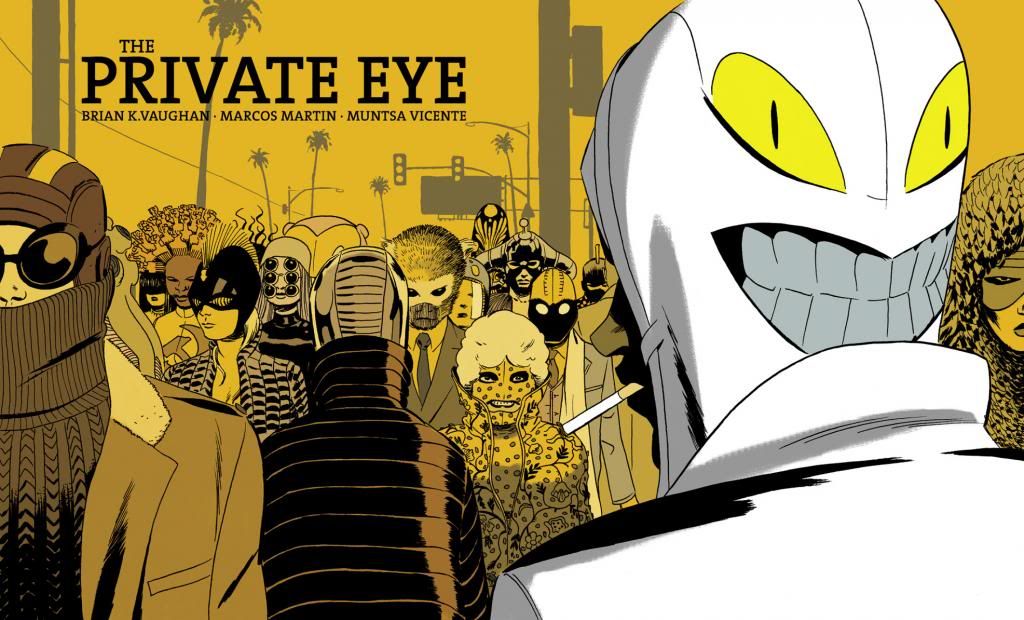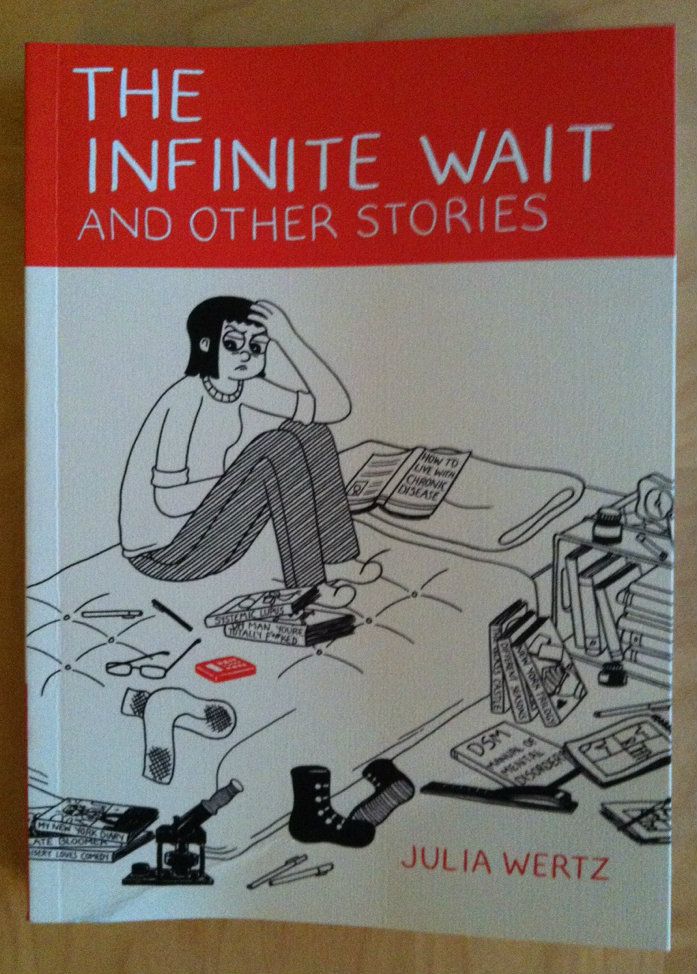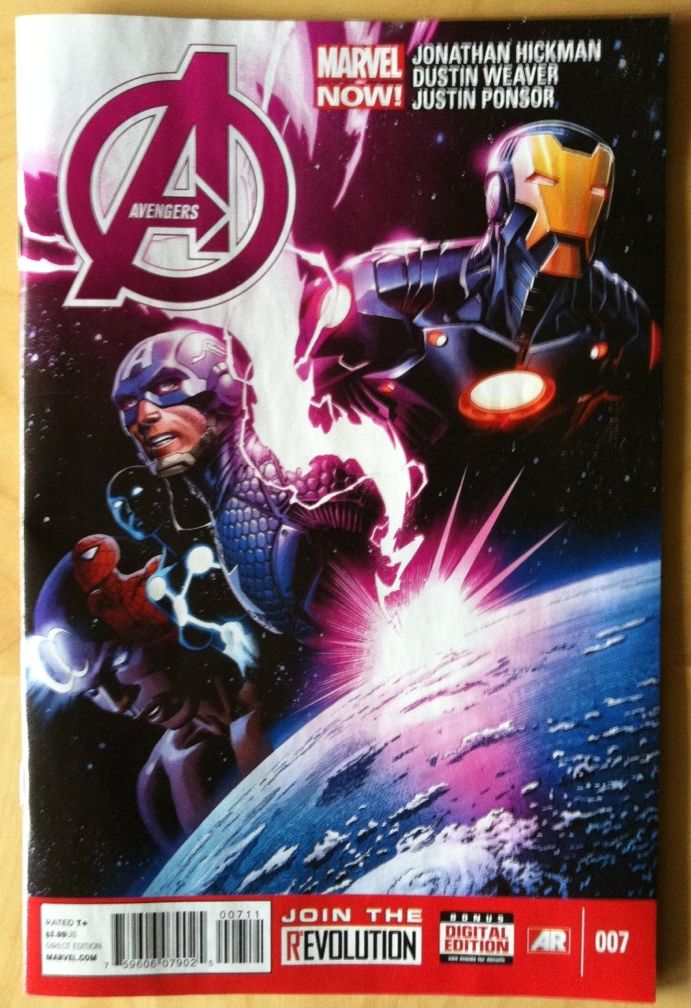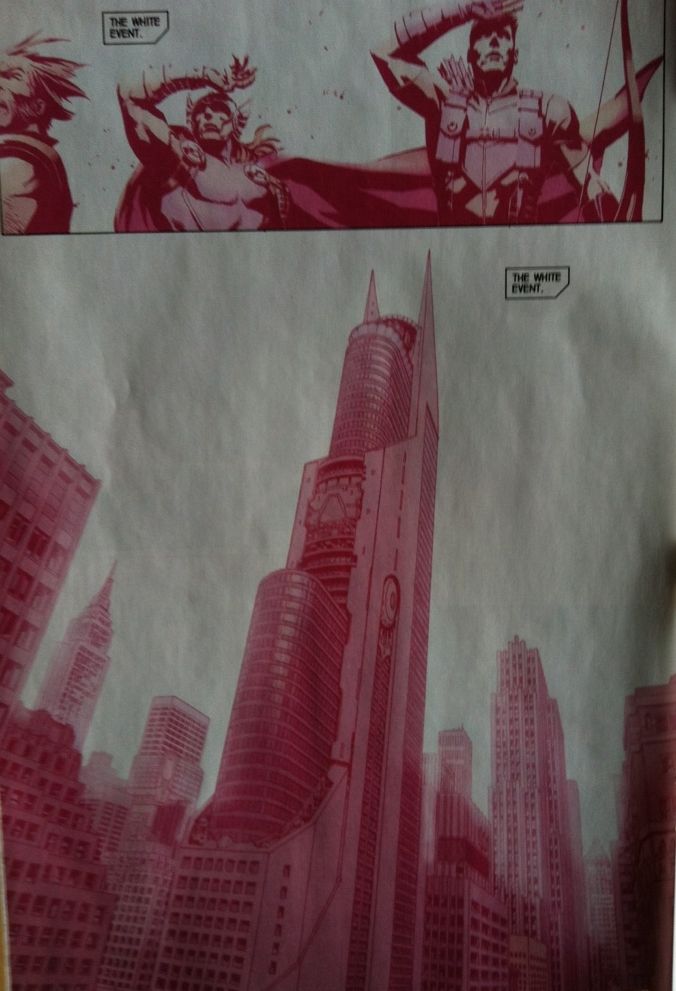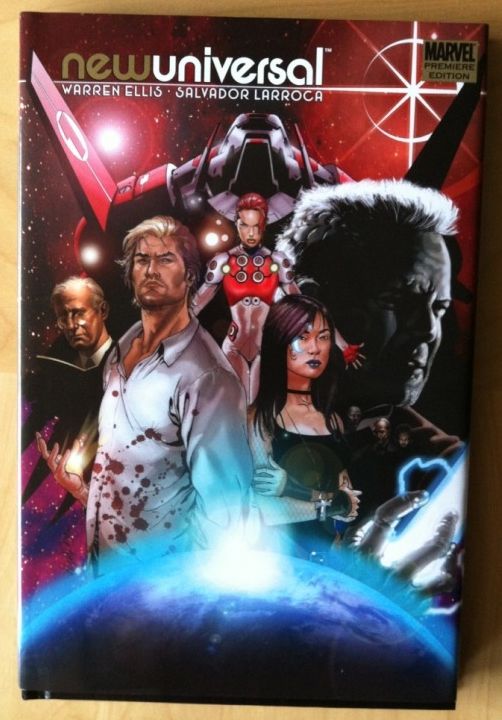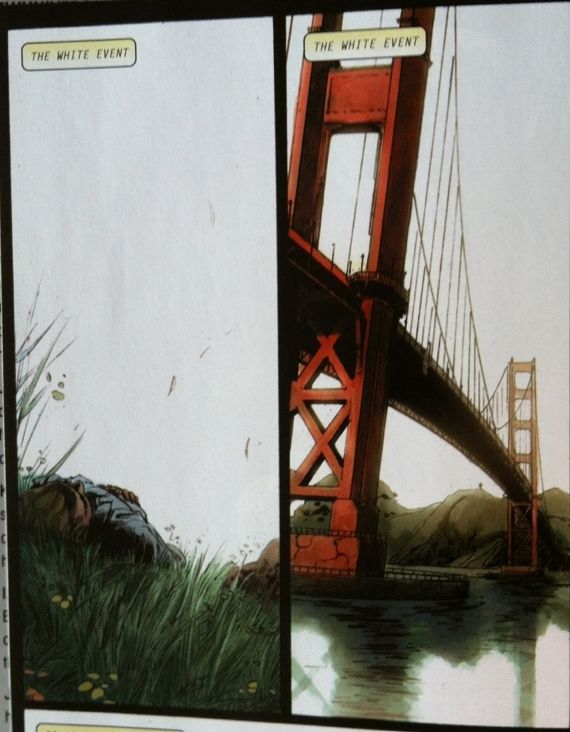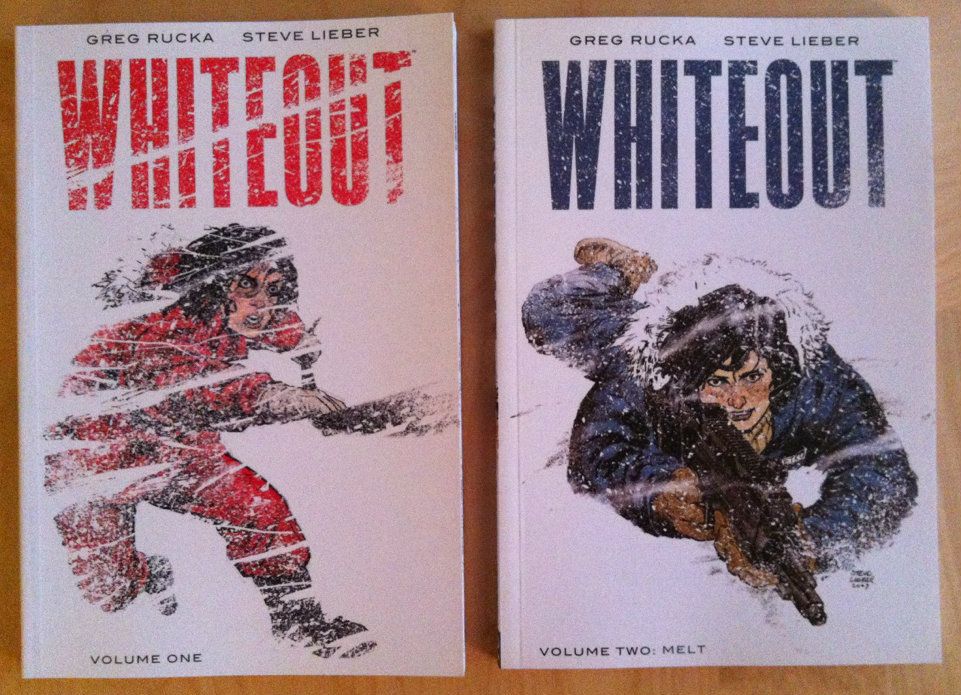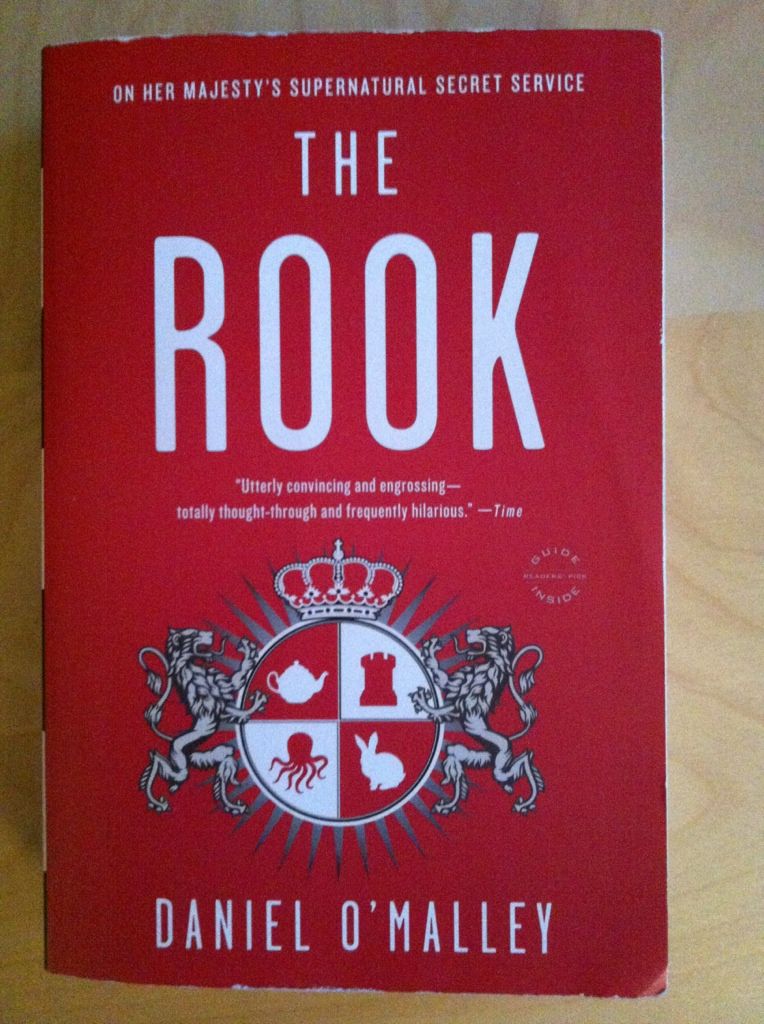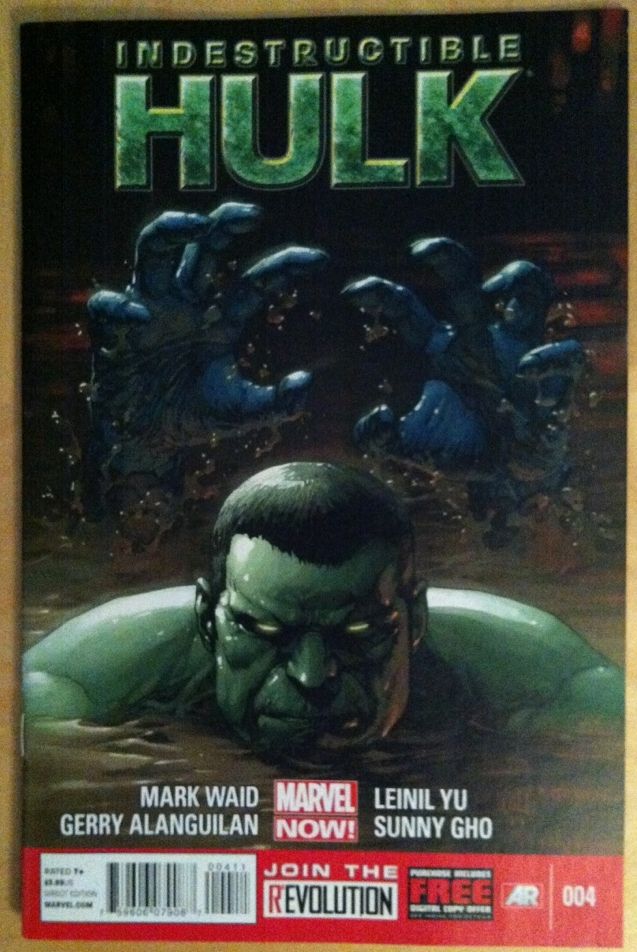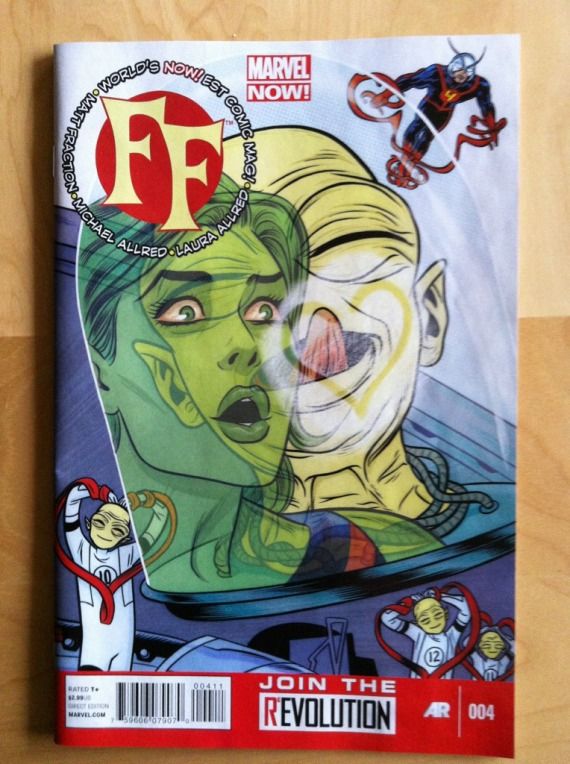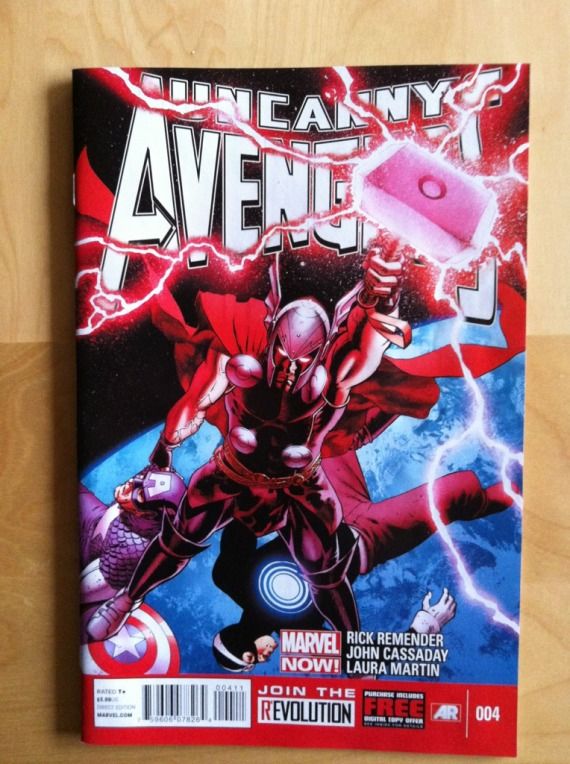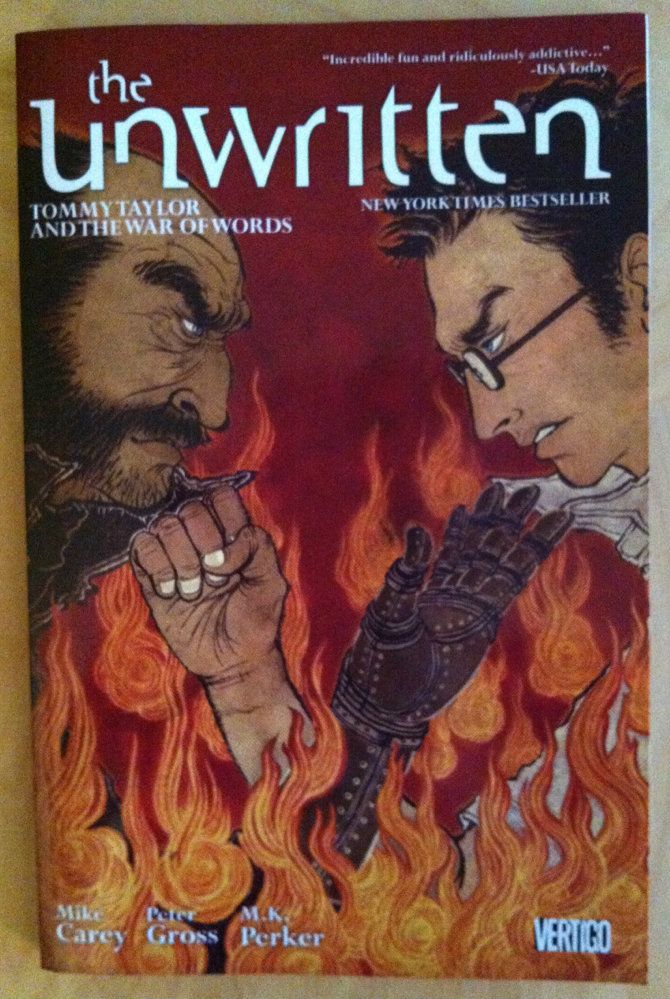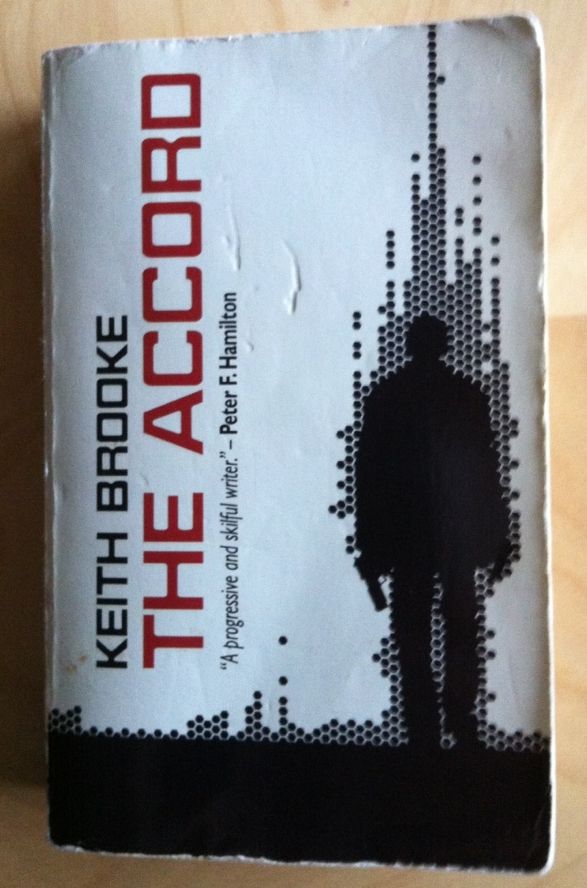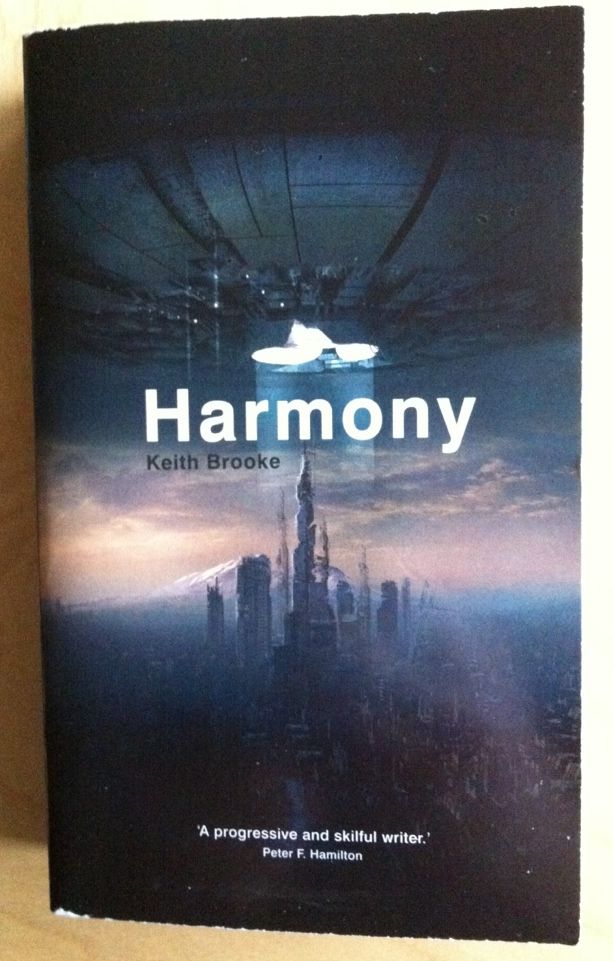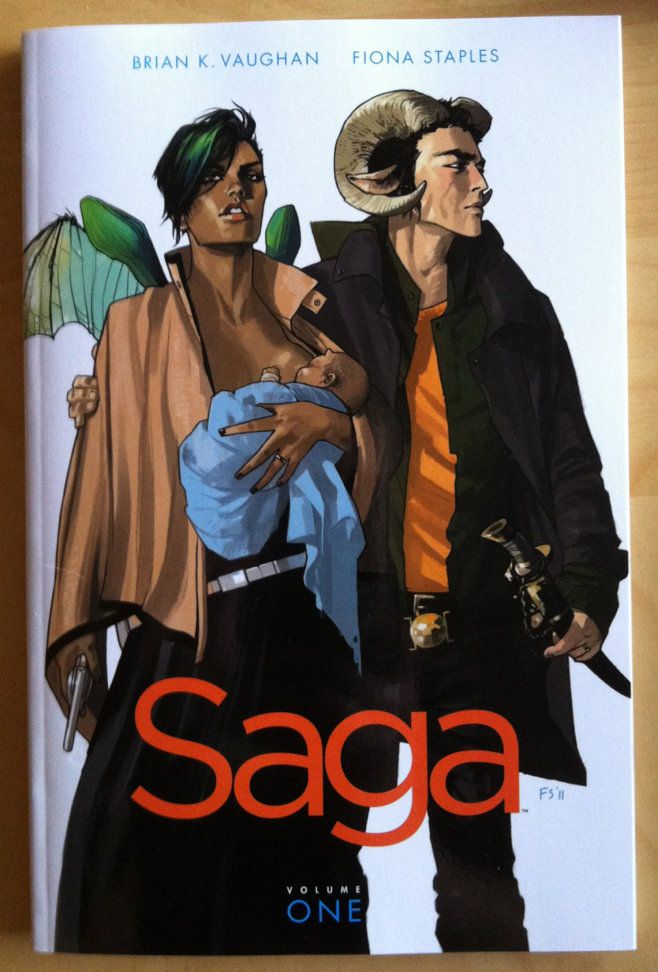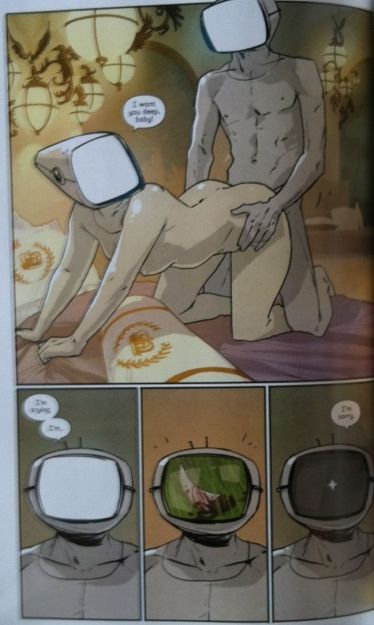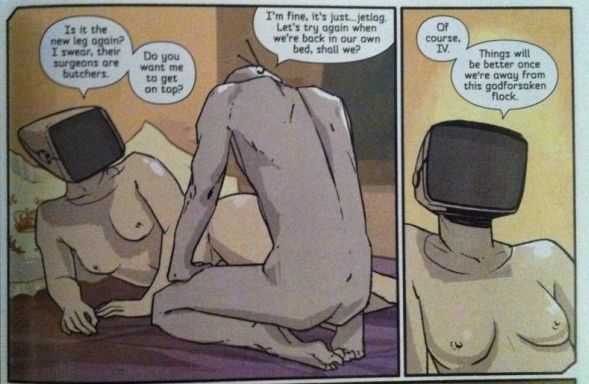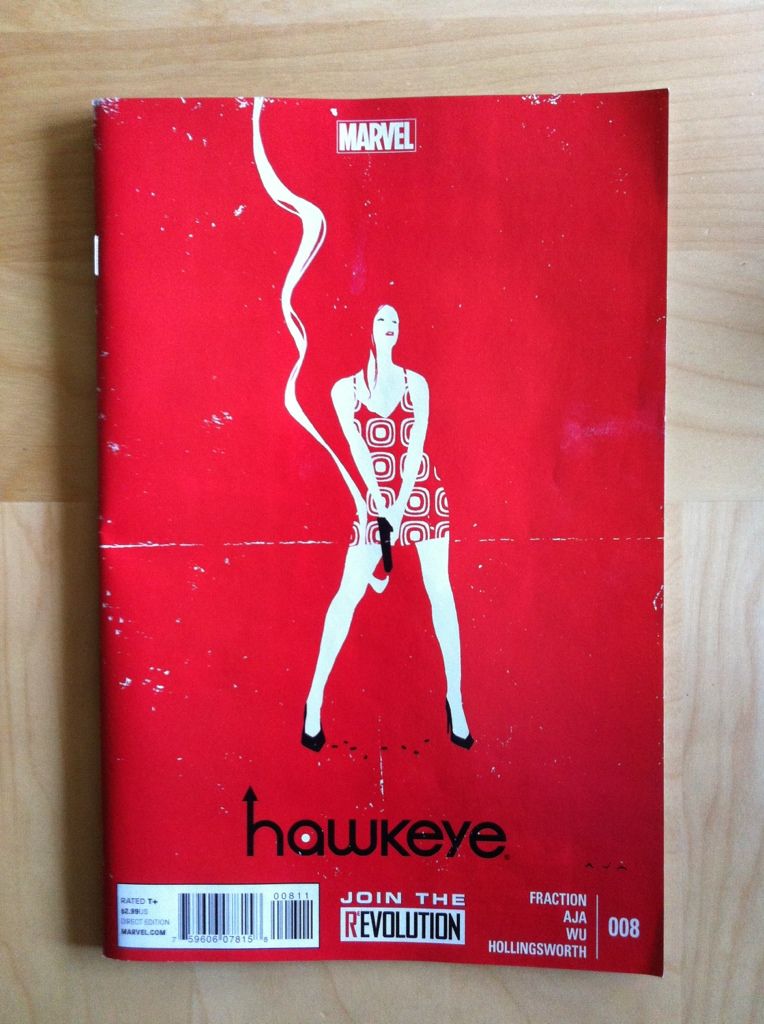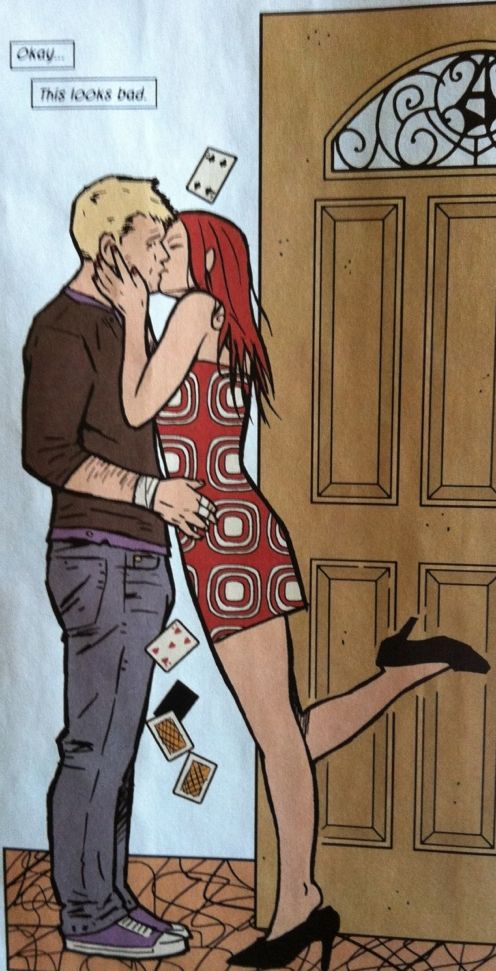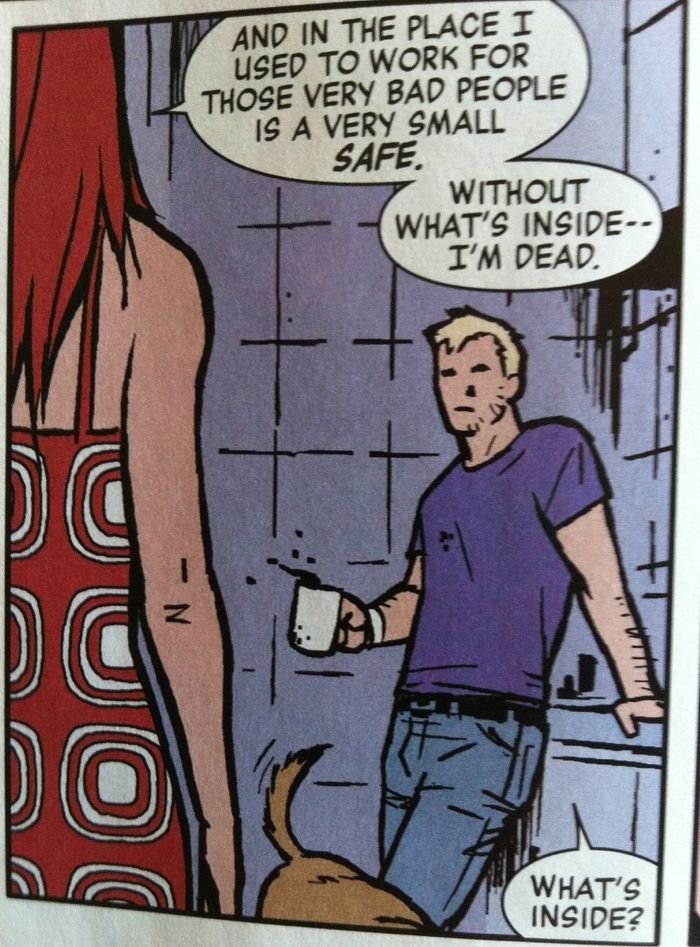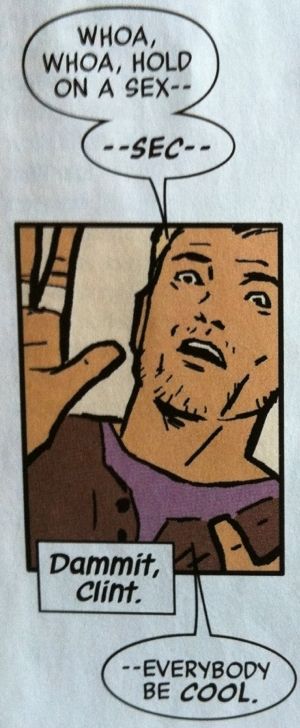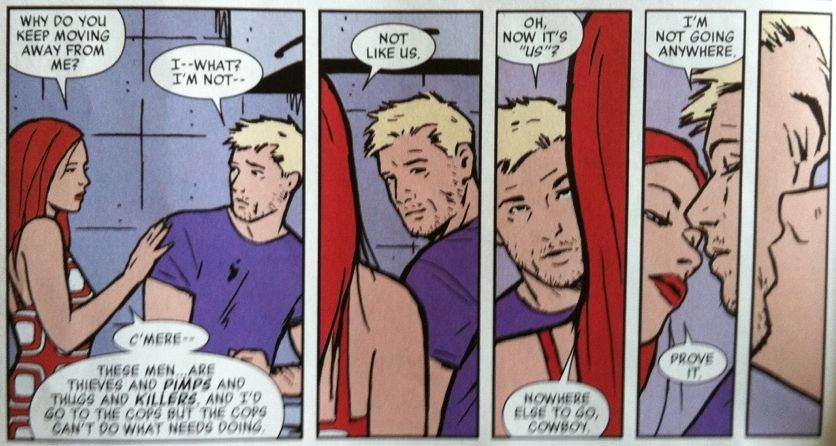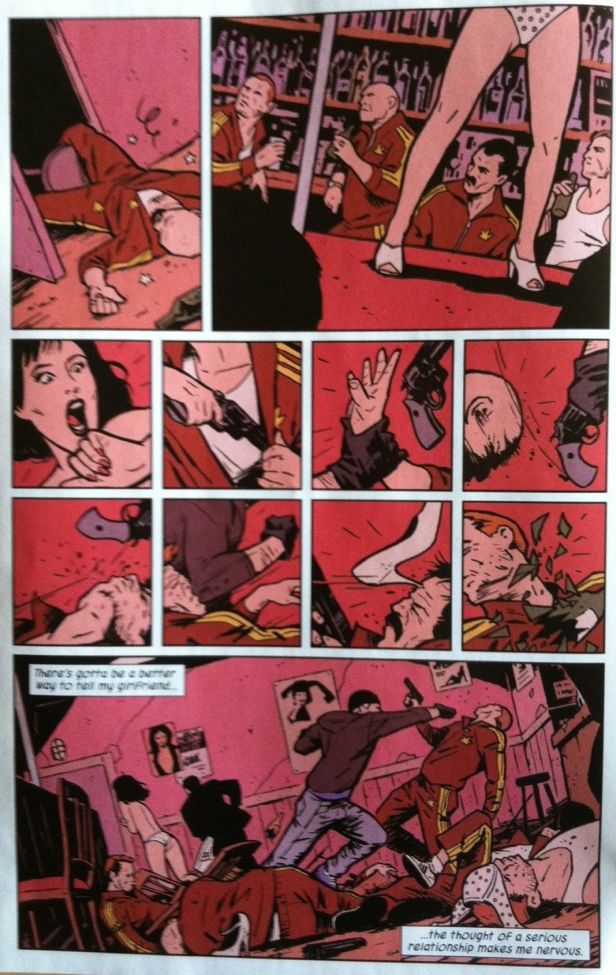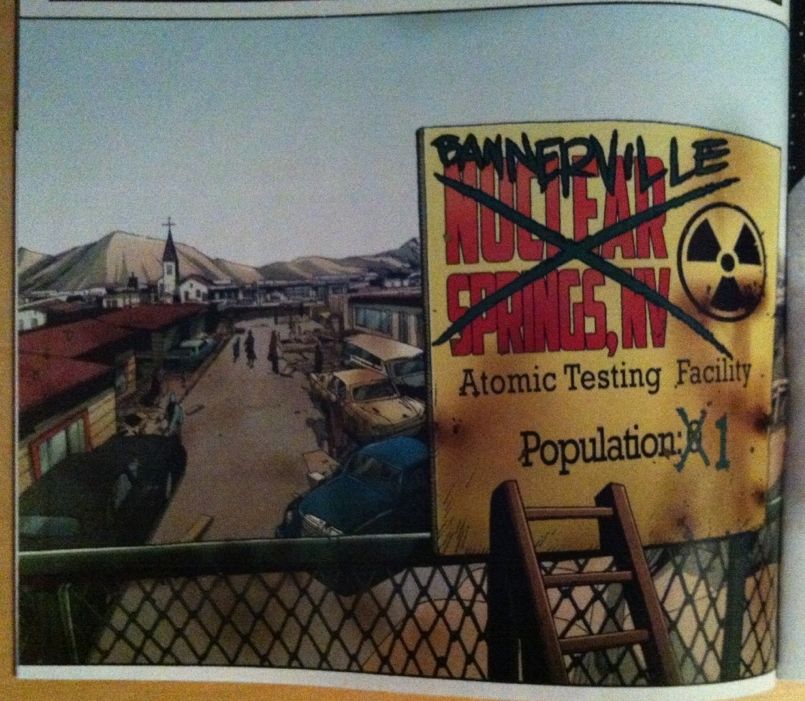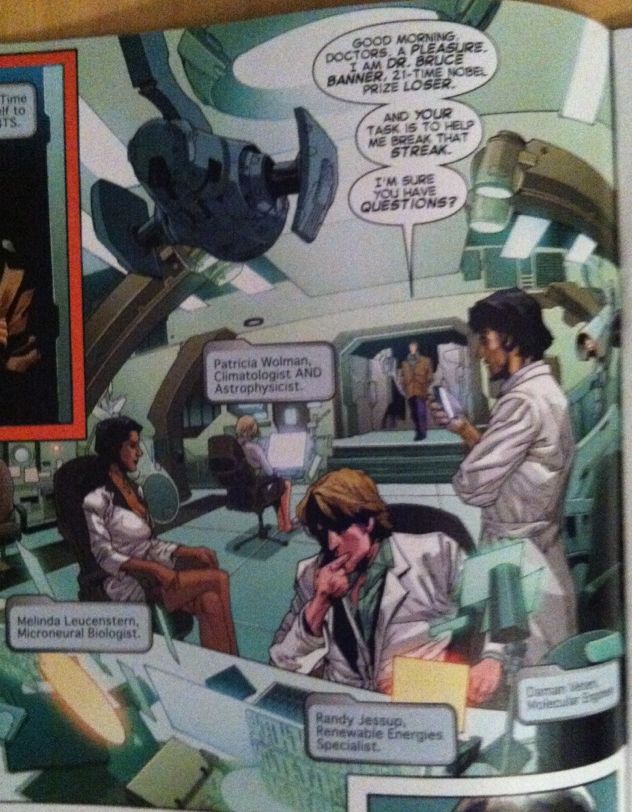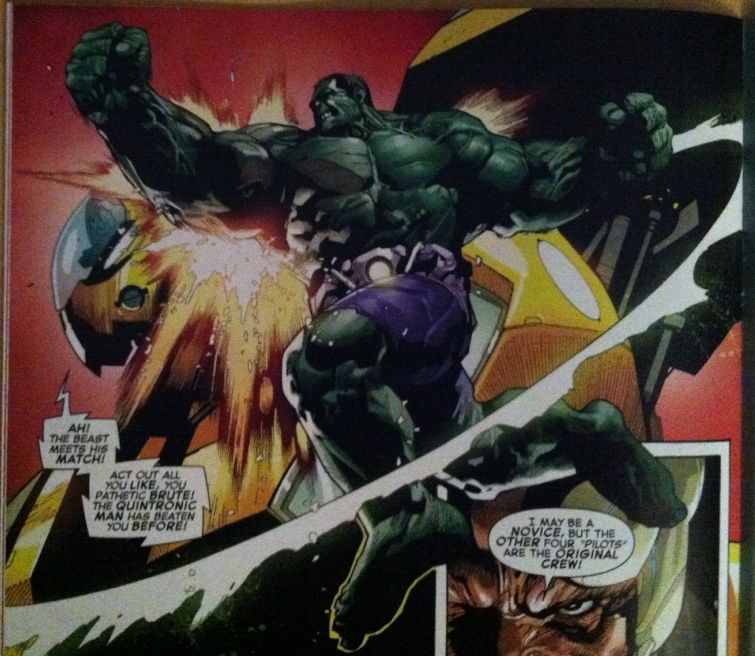Or some thoughts on Brian K Vaughan and Marcos Martin's digital comic, The Private Eye
The Private Eye is the new digital comic being made by Brian K Vaughan and Marcos Martin. It's digital only and available from The Panel Syndicate under a pay-what-you-want-scheme. (They suggest $1, but if you are especially poor/cheap you can get it for $0). The premise of the comic is that everyone in the world has a secret identity and wears a disguise to protect their privacy in a post internet world. The title character, Patrick Immelman, is a Paparazzi private eye, an investigator who bores through disguises to reveal a persons true identity. From a story perspective The Private Eye reads like a classic detective story built around a wonderful high concept and a timely discussion about privacy. The artwork in The Private Eye is sumptuous: a kind of kinetic, high resolution, pop-art infused, delight. (Before you decide I'm a dink for saying "sumptuous" go and LOOK at it.) Basically, The Private Eye is as good a comic as you would expect given it is written by Brian K Vaughan and drawn by Marcos Martin.
Go buy it, if you haven't already.
I think the first point to make is holy crap BKV and Marocs Martin. I first heard that BKV and Martin were collaborating about the time Marcos Martin left Daredevil to focus on creator owned works. I have been periodically and surreptitiously Binging this project since. All of a sudden we get teaser images and THE NEXT DAY the comic is available. Not only that, but the comic is available in a variety of formats under a PAY WHAT YOU WANT scheme. And of course the comic is amazing. Which I guess is just further proof that Brian K Vaughan and his collaborators are fucking rockstars.
I guess my next thought, which seems to be the general trend, is to remark on the self-published digital nature of the comic. I can see the obvious appeal of this kind of approach for established comics pros with the cache and name recognition of BKV and Marcos Martin: they retain complete control, don't have to worry about physically shipping and retailing items, and can use social media to advertise their comics. Minus web-hosting bandwidth, and Paypal's cut, the creators realize 100% of the profits. Given I bought the comic HOURS after it was made available speaks to the effectiveness of this. (Also, how refreshing is it that Vaughan and Martin just published their comic rather than launching yet-another Kickstarter? I mean, I feel like it's getting a little out of hand.)
All that said, I'm kind of bummed that The Private Eye is not meant to ever be a print comic. I love print. I enjoy the reading experience of actual paper in a bound volume. I enjoy displaying print comics in a way where I can enjoy the sight of them whenever I want to. I like being able to lend my print comics to friends and to share things I like with them and to try to convince them to give comics a chance. (Sharing a .pdf feels awfully close to participating in piracy.) I am not convinced that digital ONLY is better than making media available in multiple formats to cater to readers consumption preferences. Although, I am a dinosaur about these things. But dinosaurs are awesome... so... I hope this doesn't become a trend.
Another point of interest, I think, is that The Private Eye comes to us in files DRM free, which means that 1) we actually own the files (as opposed to us licensing the files from the publisher) and 2) we can take these files and duplicate them and give them to whomever we feel like. Of course, setting up an elaborate pirating ring for The Private Eye is stupid, since the option to buy it for free exists from the creators.
Combining this DRM free, highly piratable file format with the ability to straight up take it from the creators actually leaves me with a few questions. Like, did they do this because they know the people who want to pirate it will pirate it... so why not embrace that? Or is it that they want as many people to read the first issue as possible to build up a buzz for future issues and projects from The Panel Syndicate? Or, is it because the comics from the Panel Syndicate have a dual purpose?
This is wicked cynical, but I wonder to what extent The Panel Syndicate functions as a showcase for BKV and collaborator's ideas for other media? If you didn't know this, Brian K Vaughan's main career these days is writing for film and TV including a stint at Lost and, most recently, a new series based on Stephen King's Under The Dome. Now, if I were a writer for film and television a completely self-published, pay-what-you-want (to recoup costs), and highly pirate-able comic publishing platform would be what I'd want to showcase my ideas for potential clients: it beautifully illustrates the concepts and costs a fraction of actually filming something. I mean, I have no proof of this and no problem with it if it's true. I'm just curious is all.
Mostly, though, I'm just excited for the next chapter of The Panel Syndicate.
Friday, 29 March 2013
Wednesday, 27 March 2013
So I Read The Infinite Wait And Other Stories
A 250 word (or less) review of The Infinite Wait And
Other Stories graphic novel
By Julia Wertz, Koyama Press
People are inherently interesting. They live complicated lives, feel profound emotions, and they live a lifetime of events, choices, and dreams. That said, some people are more interesting than others. Julia Wertz, I think, is one of those more interesting people. The Infinite Wait is one in a series of autobiographical comics by Julia wertz that essentially tells two stories about her (well also a short thing about how great libraries are). The first part of The Infinite Wait relates Wertz's many jobs through time and acts as a terrific primer on who Julia Wertz is for anyone unfamiliar with her (like me!). The second part of the book deals with Wertz's diagnosis with systemic lupus and the emotional and physical ordeals this caused. Both stories are delivered with a matter-of-factness, a sense of humor, and a warts-and-all honesty that really makes the comic an enjoyable read. The artwork in the Infinite Wait is simple: black and white and drawn with a basic, cartoony style. It looks like a real person drew it instead of a professional illustrator (not to imply artists aren't people or Julia Wertz isn't an artist). This simple style is perfect for the story: it has a humility to it that perfectly matches the story (Wertz must be fucking tired of these kinds of comments. Sorry!). The Infinite Wait is the first autobiographic comic I have ever read and it was delightful.
By Julia Wertz, Koyama Press
People are inherently interesting. They live complicated lives, feel profound emotions, and they live a lifetime of events, choices, and dreams. That said, some people are more interesting than others. Julia Wertz, I think, is one of those more interesting people. The Infinite Wait is one in a series of autobiographical comics by Julia wertz that essentially tells two stories about her (well also a short thing about how great libraries are). The first part of The Infinite Wait relates Wertz's many jobs through time and acts as a terrific primer on who Julia Wertz is for anyone unfamiliar with her (like me!). The second part of the book deals with Wertz's diagnosis with systemic lupus and the emotional and physical ordeals this caused. Both stories are delivered with a matter-of-factness, a sense of humor, and a warts-and-all honesty that really makes the comic an enjoyable read. The artwork in the Infinite Wait is simple: black and white and drawn with a basic, cartoony style. It looks like a real person drew it instead of a professional illustrator (not to imply artists aren't people or Julia Wertz isn't an artist). This simple style is perfect for the story: it has a humility to it that perfectly matches the story (Wertz must be fucking tired of these kinds of comments. Sorry!). The Infinite Wait is the first autobiographic comic I have ever read and it was delightful.
Word count: 236
Monday, 25 March 2013
Things I Worry About: Problematic Themes
Or things I would love to have answers to.
One thing I learned from spending time with arts majors during my undergraduate is that everything is problematic in some way.
... but seriously, there is virtually no chance that any work of fiction (or otherwise) will perfectly match your particular spectrum of politics and beliefs. There is most likely, in just about every piece of media you consume, some thing that you disagree with or that strikes you as kind of hinky or uncomfortable or gross. Even if the author of the media in question shares your beliefs enitrely, there are probably some things within it (say expressed by some villain for instance) that you don't agree with. And so I think it's important to have some kind of framework for confronting and, in a lot of cases, reconciling the experience of problematic fiction. I also think that as an audience we have some kind of responsibility to hold the media we interact with to some sort of standard. I just am not quite sure what, exactly, that entails. And so I worry.
When I talk worry about media with troubling themes I don't mean poorly crafted media with hinky and gross subject matter or media that contains blatant and universally unacceptable horribleness (celebrations of sexual assault and rape, rampant misogyny obvious racism). These are easy to avoid; its very easy to choose not to read something if it is clearly hate speak or just straight up sucky.
The problem for me are those high quality, well made fictions that feature problematic themes. For instance, Alan Moore's comics Watchmen and V for Vendetta are important classics but feature some pretty troubling rape themes. Or Jason Aaron and RM Guerra's Scalped which is an insanely good crime comic that at times walks a very fine line between portraying brutal reality and callous caricature when depicting the excesses of life in Indian Country. Or Brandon Graham's wildly creative King City which at times plays heavy on the cheesecake and the male gaze in a way that doesn't serve the story. These are all really enjoyable comics that are absolutely worth reading... but are also a bit problematic. And I'm not entirely sure what the readers responsibility is in regards to this.
I guess I could just put up blinders and ignore the elements of these comics that bother me. But, well, I don't think that's okay. I think it would be great if media, and comics in particular, could do a better job at not offending people. (Comics in particular could benefit from attracting new readers because readers mean money and money means more comics to choose from. Also, you know, it's the right thing to do.) If people who purchase and read the media don't try to hold publishers and creators accountable for their bad choices, things will never improve. And really, for the majority of us the only mechanism for altering the behaviour is with our wallets. So if we don't want to see something we have to decide not to spend money on it. And I think therein lies an element of reader responsibility.
(I'm a white a dude who thinks women are attractive, so I'm what the kids call "the default audience". As a result, very little of what I read is directly attacking or disrespectful to me. I think that we (straight-white-males) have to be a bit more careful about being cognizant of these kinds of things because we are, by and large, somewhat insensitive (since it's not our flesh in the toaster) to most problematic portrayals in our media and because it would be pretty great if everyone could enjoy their media with a reasonable lack of offense. Like I can.)
I could also just straight up avoid every comic, movie, or book with anything that I find the slightest bit hinky or uncomfortable. But I think this stringent an approach lacks nuance. While I think the problematic elements in Watchmen, Scalped, and King City are uncomfortable, I don't think they invalidate all the good parts of these comics. Moreover, I get the impression that the excesses of Scalped are INTENTIONALLY brutal and uncomfortable and play to important themes in the book. And to a certain extent I think there is a nugget of validity there: creators need to be able to engage with tough themes. Pointedly ignoring horrific things, like sexual assault, is maybe as troublesome as pruriently wallowing in them. I think that creators ought to be able to, with judgement and delicate sensitivity, engage with pretty horrible shit. But for that to happen and be okay, we as readers have to also think about the portrayals being made and bring our judgement to the media. Like a dialogue.
Which all brings me to where I'm at. I think we should outright reject media with the most disgusting elements (like Holy Terror). But for milder or more nuanced problematic themes in otherwise great comics I think we can read and engage with the media. I think as long as we are cognizant of these issues when they arise and are thoughtful about what they mean and hold the comics and creators accountable, we can enjoy problematic media. I guess what I'm saying is that I think we can enjoy media with problematic themes as long as we are careful about it.
But I'm not entirely sure... which is why I worry.
One thing I learned from spending time with arts majors during my undergraduate is that everything is problematic in some way.
... but seriously, there is virtually no chance that any work of fiction (or otherwise) will perfectly match your particular spectrum of politics and beliefs. There is most likely, in just about every piece of media you consume, some thing that you disagree with or that strikes you as kind of hinky or uncomfortable or gross. Even if the author of the media in question shares your beliefs enitrely, there are probably some things within it (say expressed by some villain for instance) that you don't agree with. And so I think it's important to have some kind of framework for confronting and, in a lot of cases, reconciling the experience of problematic fiction. I also think that as an audience we have some kind of responsibility to hold the media we interact with to some sort of standard. I just am not quite sure what, exactly, that entails. And so I worry.
When I talk worry about media with troubling themes I don't mean poorly crafted media with hinky and gross subject matter or media that contains blatant and universally unacceptable horribleness (celebrations of sexual assault and rape, rampant misogyny obvious racism). These are easy to avoid; its very easy to choose not to read something if it is clearly hate speak or just straight up sucky.
The problem for me are those high quality, well made fictions that feature problematic themes. For instance, Alan Moore's comics Watchmen and V for Vendetta are important classics but feature some pretty troubling rape themes. Or Jason Aaron and RM Guerra's Scalped which is an insanely good crime comic that at times walks a very fine line between portraying brutal reality and callous caricature when depicting the excesses of life in Indian Country. Or Brandon Graham's wildly creative King City which at times plays heavy on the cheesecake and the male gaze in a way that doesn't serve the story. These are all really enjoyable comics that are absolutely worth reading... but are also a bit problematic. And I'm not entirely sure what the readers responsibility is in regards to this.
I guess I could just put up blinders and ignore the elements of these comics that bother me. But, well, I don't think that's okay. I think it would be great if media, and comics in particular, could do a better job at not offending people. (Comics in particular could benefit from attracting new readers because readers mean money and money means more comics to choose from. Also, you know, it's the right thing to do.) If people who purchase and read the media don't try to hold publishers and creators accountable for their bad choices, things will never improve. And really, for the majority of us the only mechanism for altering the behaviour is with our wallets. So if we don't want to see something we have to decide not to spend money on it. And I think therein lies an element of reader responsibility.
(I'm a white a dude who thinks women are attractive, so I'm what the kids call "the default audience". As a result, very little of what I read is directly attacking or disrespectful to me. I think that we (straight-white-males) have to be a bit more careful about being cognizant of these kinds of things because we are, by and large, somewhat insensitive (since it's not our flesh in the toaster) to most problematic portrayals in our media and because it would be pretty great if everyone could enjoy their media with a reasonable lack of offense. Like I can.)
I could also just straight up avoid every comic, movie, or book with anything that I find the slightest bit hinky or uncomfortable. But I think this stringent an approach lacks nuance. While I think the problematic elements in Watchmen, Scalped, and King City are uncomfortable, I don't think they invalidate all the good parts of these comics. Moreover, I get the impression that the excesses of Scalped are INTENTIONALLY brutal and uncomfortable and play to important themes in the book. And to a certain extent I think there is a nugget of validity there: creators need to be able to engage with tough themes. Pointedly ignoring horrific things, like sexual assault, is maybe as troublesome as pruriently wallowing in them. I think that creators ought to be able to, with judgement and delicate sensitivity, engage with pretty horrible shit. But for that to happen and be okay, we as readers have to also think about the portrayals being made and bring our judgement to the media. Like a dialogue.
Which all brings me to where I'm at. I think we should outright reject media with the most disgusting elements (like Holy Terror). But for milder or more nuanced problematic themes in otherwise great comics I think we can read and engage with the media. I think as long as we are cognizant of these issues when they arise and are thoughtful about what they mean and hold the comics and creators accountable, we can enjoy problematic media. I guess what I'm saying is that I think we can enjoy media with problematic themes as long as we are careful about it.
But I'm not entirely sure... which is why I worry.
Friday, 22 March 2013
Abseiling Avengers #7
Or Whit Event?.... why does that seem familair?
Jonathan Hickman's Avengers is yet another high concept plot machine of a book. In it Hickman and company do that thing Hickman does where he throws out crazy, high concept ideas and builds these enormous feeling high stakes plots. I'm a big fan.
In his most recent issue Avengers #7 (and a bit in Avengers #6, EDIT: Also presumably 8; this comic comes out too frequently!) I noticed something kind of perplexing happening. One of the characters, the being created by the Martian gods, is called a "Nightmask". And then we see a bunch of weird alien artifacts in the "Superflow" and then the sky glows white as a "White Event"happens. The issue climaxes with a search for a super powerful individual known as a "Starbrand".
Nightmask. Superflow. White Event. Starbrand.
In the existing Newuniversal trade: Everything Went White, we see the initiation of the White Event, a cosmic paradigm shift from an extradimensional space made of information called the Superflow. To help facilitate the turbulent times following the White Event select human beings are given powers to help quell the chaos. Izanami Randall is made into a Nightmask, a being that can travel into the information stream of the Superflow to receive information from a Communication Station placed there and to travel between different locations. Kenneth Connel is given the terrible power of the Starbrand meant to make him the ultimate guardian of humanity; a power he doesn't understand and can't control. John Tensen, a brain damaged and traumatized police officer given the Justice glyph which gives him the ability to see others guilt, a deadly weapon, and the means to carry out an insane quest for justice and vengeance. Jenny Swann, a struggling tech specialist who is made into a Cypher, a technological Savant that understands and can communicate with machines. Working against these super people is Philip L Voight and the shadowy Spitfire program which seeks to protect humanity from super humans by whatever horrific means are necessary: because if there is one superhuman, there will be two, and if there are more than two they will meet and reproduce and then humanity will be supplanted.
Jonathan Hickman's Avengers is yet another high concept plot machine of a book. In it Hickman and company do that thing Hickman does where he throws out crazy, high concept ideas and builds these enormous feeling high stakes plots. I'm a big fan.
In his most recent issue Avengers #7 (and a bit in Avengers #6, EDIT: Also presumably 8; this comic comes out too frequently!) I noticed something kind of perplexing happening. One of the characters, the being created by the Martian gods, is called a "Nightmask". And then we see a bunch of weird alien artifacts in the "Superflow" and then the sky glows white as a "White Event"happens. The issue climaxes with a search for a super powerful individual known as a "Starbrand".
Nightmask. Superflow. White Event. Starbrand.
Something about these terms stirred something in the seldom used recesses of my brain. I've definitely read some comics about these terms before... about this whole premise before. A comic that I remember being pretty great. And then I realized the comic I was thinking of was Newuniversal by Warren Ellis and Salvador Larroca.
In the existing Newuniversal trade: Everything Went White, we see the initiation of the White Event, a cosmic paradigm shift from an extradimensional space made of information called the Superflow. To help facilitate the turbulent times following the White Event select human beings are given powers to help quell the chaos. Izanami Randall is made into a Nightmask, a being that can travel into the information stream of the Superflow to receive information from a Communication Station placed there and to travel between different locations. Kenneth Connel is given the terrible power of the Starbrand meant to make him the ultimate guardian of humanity; a power he doesn't understand and can't control. John Tensen, a brain damaged and traumatized police officer given the Justice glyph which gives him the ability to see others guilt, a deadly weapon, and the means to carry out an insane quest for justice and vengeance. Jenny Swann, a struggling tech specialist who is made into a Cypher, a technological Savant that understands and can communicate with machines. Working against these super people is Philip L Voight and the shadowy Spitfire program which seeks to protect humanity from super humans by whatever horrific means are necessary: because if there is one superhuman, there will be two, and if there are more than two they will meet and reproduce and then humanity will be supplanted.
Newuniversal: Everything Went White is a pretty amazing introduction that throws out a crazy, high concept idea and builds an expansive, high stakes plot around it. It's also, as the googles point out, a pretty snappy modernization of the New Universe line of comics published by Marvel in the late '80s that saw the original version of these characters suddenly imbued with powers from a White Event. It's a great comic with terrific writing by Ellis and superb artwork by Salvador Larocca. It's also, based on the salient details, probably the keystone which Hickman is using to inspire his current story in Avengers.
Sadly, a series of computer failures destroyed Ellis' work on Newuniversal, which culminated in the hiatus and cancellation of Ellis' Newuniversal. (Well, actually there were a few one shot titles meant to buy Ellis some time to rewrite the comic, including Newuniversal: 1959, a story about the chilling lengths Philip L Voight went to to quell the 1953 White Event, which I think was Kieron Gillen's first work for Marvel.)
(There would be an image of Newuniversal 1959 here, but the issue is buried in a storage locker and I am lazy.)
I guess what the point of this kind of rambling essay is that I'm glad that Hickman's Avengers is borrowing from the pretty great premise laid out by Ellis in Newuniversal. It's pretty cool to see some of that potential used. I'd also say that if you want the background, or really dig what Hickman does with the White Event story and want to read more, that you should check out Newuniversal: Everything Went White which is apparently still available from Amazon (but not Comixology... they should fix that, eh?). I'd also recommend Newuniversal: 1959 if you can track it down somewhere.
Wednesday, 20 March 2013
So I Read Whiteout
A 250 word (or less) review of Whiteout and
Whiteout: Melt
By Greg Rucka and Steve Lieber, Oni Press
The Whiteout series tells stories about life on The Ice; about the rugged frontier world of Antarctic explorers living in the one truly alien part of the world. (I mean, think about it, Antarctica is the one place on Earth so inhospitable that humanity has never properly colonized it.) Specifically the whiteout books tell Action Thriller stories set in this frozen wasteland that pit US Marshall Carrie Stetko, literally The Law on The Ice, against her fellow arctic explorers, international criminals, and worst of all The Ice itself. From a writing standpoint, Rucka creates warm, complex characters mired in elaborate capers and suspenseful plots. The Whiteouts are compelling page turners. As strong as the writing is, the real star of the books is Steve Lieber. Rucka's scripts, while very good, are just stories until Lieber imbues them with life. Lieber's Antarctica is something to behold: a vast, white expanse punctuated under a haze of yet more white where humans are insignificant black aberrations. Lieber manages to convey the majesty, the terror, and sheer coldness of The Ice in a way that makes Whiteout’s setting seem tangible and real. Which, of course, is absolutely essential in making Antarctica a full character in the cast, which in turn makes Whiteout work as a concept. It's really something to see. Which you should: Whiteout and Whiteout: Melt are good comics.
The Whiteout series tells stories about life on The Ice; about the rugged frontier world of Antarctic explorers living in the one truly alien part of the world. (I mean, think about it, Antarctica is the one place on Earth so inhospitable that humanity has never properly colonized it.) Specifically the whiteout books tell Action Thriller stories set in this frozen wasteland that pit US Marshall Carrie Stetko, literally The Law on The Ice, against her fellow arctic explorers, international criminals, and worst of all The Ice itself. From a writing standpoint, Rucka creates warm, complex characters mired in elaborate capers and suspenseful plots. The Whiteouts are compelling page turners. As strong as the writing is, the real star of the books is Steve Lieber. Rucka's scripts, while very good, are just stories until Lieber imbues them with life. Lieber's Antarctica is something to behold: a vast, white expanse punctuated under a haze of yet more white where humans are insignificant black aberrations. Lieber manages to convey the majesty, the terror, and sheer coldness of The Ice in a way that makes Whiteout’s setting seem tangible and real. Which, of course, is absolutely essential in making Antarctica a full character in the cast, which in turn makes Whiteout work as a concept. It's really something to see. Which you should: Whiteout and Whiteout: Melt are good comics.
Word count: 227
Monday, 18 March 2013
The Rook Is A Good Book.
Or why you should read The Rook by Daniel O'Malley
I've had many bad experiences with book stores and not being able to find a particular novel (often despite it appearing as in stock on the webs) and then trekking across the city in the rain to another and another store to find it. It's frustrating. The Rook, however, was a book I picked up purely because of a well curated bookstore.
I found The Rook at a particularly large book store while traveling alone for work. I went to a bookstore because I had time to kill (which is a great function of bookstores) and to find a newly published novel I wanted for the plane ride home. Despite being well after the publication date, the store did not have the new novel (Bookstores! Man!). The bookstore did, however, have wonderfully appointed end cap displays with a feature novel surrounded by new and classic books with similar themes, motifs, or sub genres. Like a steampunk, zombie, and trippy Sci-fi display. The Rook was perched atop the superhero subgenre display (one that also featured Soon I Will Be Invincible) and that was why I picked it up.
Anyway, the book.
The Rook tells the story of a woman who gains consciousness in a park with no memory of her past, surrounded by bodies wearing latex gloves, and in a possession of a letter that tells her that her body used to belong to someone else named Myfanwy Thomas. (Myfanwy pronounced with a silent "W" so it's like Tiffany but with an "M".) The protagonist's body, this Myfanwy Thomas, was a Rook: a high ranking member of a centuries old secret society of Superhumans called the Cheque, which covertly polices paranormal activities in the United Kingdom. The protagonist's body, it is alo revealed, has the superhuman ability to control and manipulate others with a touch. Our amnesiac woman decides to take the identity of Myfanwy Thomas for herself and impersonate the former Rook in an effort to discover who exactly stole her body's memories and to avenge the former Myfanwy Thomas. With instructions and letters left by the former Rook, this new Myfanwy must hide her amnesia from her superpowered colleagues, negotiate her management position, stop an invasion by a dire supernaturel threat, and find her betrayer.
Cliche amnesia device aside, that's a pretty great premise, right?
And for the most part The Rook delivers on it: overall I enjoyed reading this book. The novel makes good use of its amnesiac device to drive the story forward and develop the fairly imaginative world of the Cheque. Moreover, The Rook also manages to be a solidly good mystery novel: twists manage to be startling and satisfying and interesting enough to have kept me turning pages. The Rook is also quite a lot of fun: it has an inherent silliness, bounciness, and humour about itself that makes the book a pleasantly charming read.
That said, The Rook is not without its faults. Its goofiness occasionally comes off as trite and distracting instead of charming and funny. At times the novel's fluffy qualities actually work against the narrative: many of the attempts at tension or horror fall a little short because the tone of the novel is far too forgiving to feel like danger will really come with significant consequences. I'd also say the The Rook is a little guilty of trying to be a serious Superhero action mystery while also playing at parody. To a certain extent, the novel may have functioned better if it had focused more clearly on being one or the other.
At the end of the day I think I'd still recommend the novel to... actually, I think there may be a really direct way to test if you, reading this, will like this book. Take the name Myfanwy, pronounced Tiffany with an "M". It's pretty much a perfect expression of the novel. It's a striking, strange, and slightly fey name with the promise of something secret that is pronounced in a somewhat mundane and silly way. Reading that name, to me at least, was this constant and conscious collision between how mysterious Myfanwy looked and how silly and fun "Miffany" sounds. Which was really my experience with The Rook. So if you read the name Myfanwy/"Miffany" and like how it feels and the tension between its two forms, I think you'll probably enjoy The Rook. If you think Myfanwy/"Miffany" looks ridiculous and stupid... then I'd try another novel.
I've had many bad experiences with book stores and not being able to find a particular novel (often despite it appearing as in stock on the webs) and then trekking across the city in the rain to another and another store to find it. It's frustrating. The Rook, however, was a book I picked up purely because of a well curated bookstore.
I found The Rook at a particularly large book store while traveling alone for work. I went to a bookstore because I had time to kill (which is a great function of bookstores) and to find a newly published novel I wanted for the plane ride home. Despite being well after the publication date, the store did not have the new novel (Bookstores! Man!). The bookstore did, however, have wonderfully appointed end cap displays with a feature novel surrounded by new and classic books with similar themes, motifs, or sub genres. Like a steampunk, zombie, and trippy Sci-fi display. The Rook was perched atop the superhero subgenre display (one that also featured Soon I Will Be Invincible) and that was why I picked it up.
Anyway, the book.
The Rook tells the story of a woman who gains consciousness in a park with no memory of her past, surrounded by bodies wearing latex gloves, and in a possession of a letter that tells her that her body used to belong to someone else named Myfanwy Thomas. (Myfanwy pronounced with a silent "W" so it's like Tiffany but with an "M".) The protagonist's body, this Myfanwy Thomas, was a Rook: a high ranking member of a centuries old secret society of Superhumans called the Cheque, which covertly polices paranormal activities in the United Kingdom. The protagonist's body, it is alo revealed, has the superhuman ability to control and manipulate others with a touch. Our amnesiac woman decides to take the identity of Myfanwy Thomas for herself and impersonate the former Rook in an effort to discover who exactly stole her body's memories and to avenge the former Myfanwy Thomas. With instructions and letters left by the former Rook, this new Myfanwy must hide her amnesia from her superpowered colleagues, negotiate her management position, stop an invasion by a dire supernaturel threat, and find her betrayer.
Cliche amnesia device aside, that's a pretty great premise, right?
And for the most part The Rook delivers on it: overall I enjoyed reading this book. The novel makes good use of its amnesiac device to drive the story forward and develop the fairly imaginative world of the Cheque. Moreover, The Rook also manages to be a solidly good mystery novel: twists manage to be startling and satisfying and interesting enough to have kept me turning pages. The Rook is also quite a lot of fun: it has an inherent silliness, bounciness, and humour about itself that makes the book a pleasantly charming read.
That said, The Rook is not without its faults. Its goofiness occasionally comes off as trite and distracting instead of charming and funny. At times the novel's fluffy qualities actually work against the narrative: many of the attempts at tension or horror fall a little short because the tone of the novel is far too forgiving to feel like danger will really come with significant consequences. I'd also say the The Rook is a little guilty of trying to be a serious Superhero action mystery while also playing at parody. To a certain extent, the novel may have functioned better if it had focused more clearly on being one or the other.
At the end of the day I think I'd still recommend the novel to... actually, I think there may be a really direct way to test if you, reading this, will like this book. Take the name Myfanwy, pronounced Tiffany with an "M". It's pretty much a perfect expression of the novel. It's a striking, strange, and slightly fey name with the promise of something secret that is pronounced in a somewhat mundane and silly way. Reading that name, to me at least, was this constant and conscious collision between how mysterious Myfanwy looked and how silly and fun "Miffany" sounds. Which was really my experience with The Rook. So if you read the name Myfanwy/"Miffany" and like how it feels and the tension between its two forms, I think you'll probably enjoy The Rook. If you think Myfanwy/"Miffany" looks ridiculous and stupid... then I'd try another novel.
Friday, 15 March 2013
Atoll Comics Round 8 (and 6!)
Or Changes to My Top-Ten Comics
Due to poverty and an urge to buy better comics, I have decided to be super-selective about which superhero comics I read. Harnessing the Awesome Power of Maths, I have determined that I can afford to read 10 ongoing titles. So I get to read 10, and only 10, titles published by either Marvel or DC as well as one trade paperback a week of my choosing.
A complication of this is that I am forced to drop an on-going title if I want to try reading a new on-going title, an act of very tough love. Being financially responsible is the worst.
In Atoll Comics Round 6 I decided to pit The Indestructible Hulk and FF head-to-head in a trial basis to see which one would get incorporated into my top-ten reading list. Trouble is, I really enjoyed both comics immensely and still haven't quite decided which one I like best. But in a twist ending, I have decided that I like both titles more than one of my current top ten comics. So without further preamble:
Why Indestructible Hulk? Essentially because it's a Hulk book that's good. I've always had trouble with the Hulk when he isn't in an ensemble because he feels a tad one-note. (I mean, it's a good note, but Hulk Smash only gets a narrative so far on its own.) The central hook of the comic: Banner is trying to maximise the good he can do as Banner while offering the Hulk as a weapon for SHIELD is brilliant. I am also pretty excited about the Banner centric world Waid and Yu are building: I am genuinely interested in learning more about the supporting cast and Banner and where all of this part of the story is going. The only reason this comic hasn't completely grabbed me is that the super fascinating Banner narrative keeps getting tossed aside for the Hulk to go smash something unrelated to this developing storyline. I'm not entirely sure this isn't intentionally a meta-commentary on what it's like to be Banner. It might also just be a practical story logistic thing that allows Waid and Yu to slowly build up and develop the main story of the series while still dishing out big scoops of Hulk smashing. Hopefully as the series progresses The Indestructible Hulk can add some drama to the smashing, but for the moment I am on board.
Why FF? This is a series that is finally delivering what it promised. A comic with Matt Fraction and Mike Allred should be, at least in theory, something I very much want to read. But balanced against this is the fact that I really like walking away from long, finished feeling comic runs: I feel like Hickman's Fantastic Four and FF are reading experiences that need to be savoured. So, despite the incredible creative team I was a bit hesitant to jump into this new FF. But now that it has some time to establish itself and grow into its identity, well, I needn't have worried. This comic is completely its own glorious, weird, funny comic that is completely distinct from the high concept Science Fiction opera of the previous iteration of the FF. It took a while to get there, but the most recent issues: where Thing mask wearing Yancy Street hoodlums accost Ms. Thing and where the Moloid kids try to ruin a date between She-Hulk and Wyatt Wingfoot are just so wacky and off-beat and great. If this is the comic FF is going to be going forward, I'm fully on board for the duration.
Why not Uncanny Avengers? I still think Uncanny Avengers is a pretty great comic: mixing X-men and Avengers is a great idea and the execution of art and writing is top notch. It's without a doubt a very good comic. Then why am I dropping it? Well, part of it is competition with other Avengers books. In a world where I am reading only ten comics I don't really need to read three similar team books with overlapping casts. When contrasted against fun, punchy, and continuity light Avengers Assemble (Kelly Sue DeConnick) and serious, elaborate, and high concept Avengers (Jonathan Hickman), Uncanny Avengers suffers a bit by being, compared to these polar extremes, middle of the road. It's not as fun as Avengers Assemble and not as high stakes and thinky as Avengers... it's somewhere in between. And in a limited reading list, something that doesn't stand out is at a disadvantage. Another issue I have with Uncanny Avengers is that it just. Keeps. Getting. WEIRDER. After a very balanced first issue Uncanny Avengers nailed the accelerator to the floor and just starting throwing crazier and crazier action at the reader without leaving any space to breath or sort out what was happening. And the cliffhanger at the end of the first story arch promises to be EVEN CRAZIER YET!! I understand that this kind of all-action-all-the-time style of writing is popular with some people, but the fact is I really like the quiet character driven moments in comics. Without these moments comics are just so much fighting, which, at least for me, lacks the dramatic weight of conflicts rooted in character or thematic context. (That said, I don't think this is a flaw in the book so much as it's just not being written for me... the fact that I can choose between Crazy Action Avengers, Fun Character-driven Avengers, and Elaborately-Plotted Expansive Avengers is probably a strength of Marvel's current lineup: there are different things for different folks.) So basically, I am dropping this book because, while it is very good, it's just not quiet what I like in comics.
Wednesday, 13 March 2013
So I Read The Unwritten: Tommy Taylor And The War Of Words
A 250 word (or less) review of the sixth trade of The
Unwritten
By Mike Carey, Peter Gross, MK Perker, Dean Ormston, Vince
Locke, Michael MW Kaluta,
Gary Erskine, Rick Geary, Bryan Talbot, and Gabriel
Hernandez Walta; Vertigo Comics
(This review contains mild *SPOILERS*. To read a *SPOILER*
free review of The Unwritten: go here.)
The Unwritten is a comic about how stories shape human
societies and the struggle to control this power through literature.
Specifically the comic series focuses on Tom Taylor, the real life inspiration
for a Harry Potter-esque boy wizard, and his fight to destroy a Cabal who have
been manipulating the publishing industry for centuries. Tommy Taylor And The
War Of Words tells the story of Tom Taylor taking the fight directly to the
cabal and represents the climax of many of the comic’s ongoing storylines. The
core story is action-packed and the explanations and resolutions provided in
this collection are overall quite satisfying. Carey and Gross also tell the
origin stories of many of The Unwritten’s villains and supporting characters
interspersed between main chapters. Much like the main chapters, these origins
are well written and really pay off ideas established elsewhere in the series. To
keep the dramatic main plot ticking away while still telling elaborate origin
stories, Carey and Gross resorted to double publishing The Unwritten during the
time span collected in Tommy Taylor And The War Of Worlds. This publishing
strategy necessitated fill-in and finishing artists for Peter Gross. The resulting
art is still very nice and overall manages to closely match Gross’ style but occasionally
enters this uncanny valley territory of looking ever-so-slightly off… it’s a little
like a peripheral vision distraction. Still, Tommy Taylor And The War Of Words
is a great comic in a great series. I have no idea what comes next.
Word count: 248
Previously:
Monday, 11 March 2013
The Accord and Harmony Are Good Books
Or why you should read The Accord and Harmony by Keith Brooke
Keith Brooke is a Science Fiction author I never hear anything about. Which is profoundly weird because he is really, really good. He writes very high concept Sci-fi rendered in richly textured prose built around emotionally riveting human dramas. And yet... nothing. Now, I probably don't follow Sci-fi novel journalism well enough to be an expert, but it still surprises me that Keith Brooke isn't a bigger deal.
The Accord: The Accord tells the story of an extra marital affair between Professor Noah Barakh and Electee Priscilla Burnham and the jealousy of her husband, the powerful Elector Jack Burnham. The Accord is also the story of Elector Burnham as he tries to govern a world devastated by over population, ecological abuse, and ethnic warfare. The Accord also tells the story of Professor Barakh as he tries to construct The Accord, a consesual virtual reality designed to house the digitized minds of the dead of a dying planet. The Accord also tells the story of Priscilla as a post-life human attempting to navigate The Accord and discover meaning now that she is functionally immortal. The Accord is a novel that uses Science Fiction to explore gigantic ideas from the consequences of a literal, manufactured heaven; to the effects of human immortality and reincarnation; to the risks of rendering of human minds/souls into mutable digital information. And in the best tradition of Sci-fi the novel takes these huge thought experiments, sprinkles them liberally with tiny grains of profound smaller ideas, and hangs them all on a scaffold of a beautiful and eminently relatable love story. It's one of the most thought provoking and thoughtful hard Science Fiction novels I have ever read. It's also one of the more beautifully written ones: The Accord's sumptuous prose borrows the syntax and rhythm of preachers and scripture in a way that really complements he thematic discussions. If I were going to create a list of ten Sci-fi novels everyone should have to read, The Accord would be among them. I do not understand how this novel isn't a bigger deal.
Harmony: In Harmony, Humanity is a marginalized group living among a wide variety of alien species who are relegated to ghettos on the fringes of this bizarre society. Dodge Mercer is one such downtrodden human, scrapping out his meagre living by staying one step ahead of the alien authorities, until he meets Hope Burren, a strange girl who carries in her mind the voices of countless people and, perhaps, the key to humanity's future. Together Dodge and Hope must make a pilgrimage to save their people. Harmony is another complex, well written Science Fiction novel. It has it's own unique voice, but one that carries distinct notes of Charles Dickens, Cyberpunk, and a Clockwork Orange. Thematically, Harmony is even more complex. The novel is clearly a parable of a certain nature, but what nature doesn't become immediately clear. For a big chunk of the book I was convinced that it was riffing on Jewish history: the diaspora, the Holocaust, the establishment of Isreal... and while I'm sure that reading is there it is not the main point of Harmony. No, the real moral, the real push of Harmony isn't really revealed until the last ten pages or so and when it drops... it's perfect. Harmony is just another masterful Sci-fi novel that should also be a bigger deal than it apparently is.
Keith Brooke is a Science Fiction author I never hear anything about. Which is profoundly weird because he is really, really good. He writes very high concept Sci-fi rendered in richly textured prose built around emotionally riveting human dramas. And yet... nothing. Now, I probably don't follow Sci-fi novel journalism well enough to be an expert, but it still surprises me that Keith Brooke isn't a bigger deal.
The Accord: The Accord tells the story of an extra marital affair between Professor Noah Barakh and Electee Priscilla Burnham and the jealousy of her husband, the powerful Elector Jack Burnham. The Accord is also the story of Elector Burnham as he tries to govern a world devastated by over population, ecological abuse, and ethnic warfare. The Accord also tells the story of Professor Barakh as he tries to construct The Accord, a consesual virtual reality designed to house the digitized minds of the dead of a dying planet. The Accord also tells the story of Priscilla as a post-life human attempting to navigate The Accord and discover meaning now that she is functionally immortal. The Accord is a novel that uses Science Fiction to explore gigantic ideas from the consequences of a literal, manufactured heaven; to the effects of human immortality and reincarnation; to the risks of rendering of human minds/souls into mutable digital information. And in the best tradition of Sci-fi the novel takes these huge thought experiments, sprinkles them liberally with tiny grains of profound smaller ideas, and hangs them all on a scaffold of a beautiful and eminently relatable love story. It's one of the most thought provoking and thoughtful hard Science Fiction novels I have ever read. It's also one of the more beautifully written ones: The Accord's sumptuous prose borrows the syntax and rhythm of preachers and scripture in a way that really complements he thematic discussions. If I were going to create a list of ten Sci-fi novels everyone should have to read, The Accord would be among them. I do not understand how this novel isn't a bigger deal.
Harmony: In Harmony, Humanity is a marginalized group living among a wide variety of alien species who are relegated to ghettos on the fringes of this bizarre society. Dodge Mercer is one such downtrodden human, scrapping out his meagre living by staying one step ahead of the alien authorities, until he meets Hope Burren, a strange girl who carries in her mind the voices of countless people and, perhaps, the key to humanity's future. Together Dodge and Hope must make a pilgrimage to save their people. Harmony is another complex, well written Science Fiction novel. It has it's own unique voice, but one that carries distinct notes of Charles Dickens, Cyberpunk, and a Clockwork Orange. Thematically, Harmony is even more complex. The novel is clearly a parable of a certain nature, but what nature doesn't become immediately clear. For a big chunk of the book I was convinced that it was riffing on Jewish history: the diaspora, the Holocaust, the establishment of Isreal... and while I'm sure that reading is there it is not the main point of Harmony. No, the real moral, the real push of Harmony isn't really revealed until the last ten pages or so and when it drops... it's perfect. Harmony is just another masterful Sci-fi novel that should also be a bigger deal than it apparently is.
Friday, 8 March 2013
Sexy Saga
Or a wonky essay on television headed robot royalty having intercourse.
Saga, by Bryan K Vaughan and Fiona Staples is pretty incredible and is a great example of why everyone should read comic books. It's smart, fun, and beautiful; an absolute rockstar book.
Anyway I noticed something in it, that as far as I can ascertain by googling, no one has discretely pointed out yet. And for posterity I'd like to point out that during the scene where the TV headed robot royalty are having graphic on panel sex that they are "turned on".
I mean, this scene is after it is established that the TV headed robot royalty normally have dark screened heads. So, when our robot royals are having the sex their screen faces are emitting white light it isn't their default expression/display. Furthermore, when Prince Robot IV loses his erection his screen darkens, and then his wife's screen also darkens when it is apparent that the sex isn't happening. So they are no longer "turned on".
So yeah, really clever minor jokey thing about the robot royals being "turned on".
But this great little art descision pun aside, this is a pretty great scene for a bunch of additional reasons too.
Prior to this scene in Saga: Volume 1, I kind of felt that I had a handle on what the series was going to be. It felt familiar when placed in the context of other Science Fiction. I mean prior to this you could categorize Saga as something like: "Shakespearianish literal star-crossed lovers in an epic intergalactic conflict." And then bam, we have naked TV-headed robots fucking. It's a great statement that, no, no we do not have Saga hammered down, and that this book won't be so easily classified and understood. Because once we think we've put it in a familiar box, we'll get something crazy like TV headed robot royalty having sex.
This scene is also pretty great as an introduction to Prince Robot IV, one of the main antagonists of the comic. It brilliantly sets him up right from the get go as more than a one dimensional villain. Instead of being a simple murder robot, he is a person with desires, emotions, and family. He is a man (kind of) that is only interested in pursuing the protagonists as a means to get back to his pregnant wife which is an understandable motivation and a smart concept: Prince Robot IV must destroy what Markos and Alana have to get that very same thing. But beyond that, visually putting him in such a human/intimate/familair position at first glance means that we will always picture him as a person, as a complex character, in all of his future interactions. TV-headed royal fucking, it's a great way to introduce a character.
The next reason this scene is great takes a bit of explaining.
I think we as a society have a really peculiar and maybe unhealthy approach to portraying sex in our media. We relentlessly censor it and push it the margins of most of our media. In happy media with functional people sex is almost always pushed out of focus: a couple kisses passionately and we fade out, because to actually show it would be immature, puerile, or icky. Which oddly has the affect of making a lot of the sex in a lot of our media pretty dysfunctional: it's frequently only displayed or discussed in raunchy, shock comedies or when its transgressive, or when someone is being murdered, raped, or both. Or it's porn, which you know is fine, but even then so much of that is just grim-faced, emotionless, orifice stuffing... that I find a lot of it uncanny valley creepy. Which all sort of results in very little fun, companionate sex in media and a lot of weird, violent, or, at least to me, vaguely off putting fucking.
Which is pretty messed up right? I mean, sex is pretty central to the human experience: the vast majority of us are fundamentally wired to enjoy it and it's how we go about reproducing which is kind of important to us as a species. It perpetually strikes me that the fact we consider it more private and shameful and censorable than murder and violence and rape is all kinds of fucked up. And I think the fact there are so few portrayals of people having stable, emotionally satisfying sex in our media is wicked sad.
So, a big part of why I find this scene so amazing is that it portrays that kind of comfortable sex that happens between people in a stable, loving relationship. Prince Robot IV and his wife are partnered people, who clearly have a strong emotional connection as well as a comfotable familiarity And as a result a healthy sex life. And here they are having vanilla sex, not for puerile thrill, but because they have been apart and love one another. Hell, they are also trying to procreate, which even if you object to fornication or sex-for-fun, is kind of the point we can all agree on about sex. Contrasted with the majority of our portrayals of sex in our media and this is extremely healthy and normal sex. Just, you know, between TV-headed robot royalty. And the fact that such bizarre creatures are having one of the few (and in comics only that I've read), examples of stable, coupled sex is frankly kind of amazing and brilliant.
Saga, by Bryan K Vaughan and Fiona Staples is pretty incredible and is a great example of why everyone should read comic books. It's smart, fun, and beautiful; an absolute rockstar book.
Anyway I noticed something in it, that as far as I can ascertain by googling, no one has discretely pointed out yet. And for posterity I'd like to point out that during the scene where the TV headed robot royalty are having graphic on panel sex that they are "turned on".
I mean, this scene is after it is established that the TV headed robot royalty normally have dark screened heads. So, when our robot royals are having the sex their screen faces are emitting white light it isn't their default expression/display. Furthermore, when Prince Robot IV loses his erection his screen darkens, and then his wife's screen also darkens when it is apparent that the sex isn't happening. So they are no longer "turned on".
So yeah, really clever minor jokey thing about the robot royals being "turned on".
But this great little art descision pun aside, this is a pretty great scene for a bunch of additional reasons too.
Prior to this scene in Saga: Volume 1, I kind of felt that I had a handle on what the series was going to be. It felt familiar when placed in the context of other Science Fiction. I mean prior to this you could categorize Saga as something like: "Shakespearianish literal star-crossed lovers in an epic intergalactic conflict." And then bam, we have naked TV-headed robots fucking. It's a great statement that, no, no we do not have Saga hammered down, and that this book won't be so easily classified and understood. Because once we think we've put it in a familiar box, we'll get something crazy like TV headed robot royalty having sex.
This scene is also pretty great as an introduction to Prince Robot IV, one of the main antagonists of the comic. It brilliantly sets him up right from the get go as more than a one dimensional villain. Instead of being a simple murder robot, he is a person with desires, emotions, and family. He is a man (kind of) that is only interested in pursuing the protagonists as a means to get back to his pregnant wife which is an understandable motivation and a smart concept: Prince Robot IV must destroy what Markos and Alana have to get that very same thing. But beyond that, visually putting him in such a human/intimate/familair position at first glance means that we will always picture him as a person, as a complex character, in all of his future interactions. TV-headed royal fucking, it's a great way to introduce a character.
The next reason this scene is great takes a bit of explaining.
I think we as a society have a really peculiar and maybe unhealthy approach to portraying sex in our media. We relentlessly censor it and push it the margins of most of our media. In happy media with functional people sex is almost always pushed out of focus: a couple kisses passionately and we fade out, because to actually show it would be immature, puerile, or icky. Which oddly has the affect of making a lot of the sex in a lot of our media pretty dysfunctional: it's frequently only displayed or discussed in raunchy, shock comedies or when its transgressive, or when someone is being murdered, raped, or both. Or it's porn, which you know is fine, but even then so much of that is just grim-faced, emotionless, orifice stuffing... that I find a lot of it uncanny valley creepy. Which all sort of results in very little fun, companionate sex in media and a lot of weird, violent, or, at least to me, vaguely off putting fucking.
Which is pretty messed up right? I mean, sex is pretty central to the human experience: the vast majority of us are fundamentally wired to enjoy it and it's how we go about reproducing which is kind of important to us as a species. It perpetually strikes me that the fact we consider it more private and shameful and censorable than murder and violence and rape is all kinds of fucked up. And I think the fact there are so few portrayals of people having stable, emotionally satisfying sex in our media is wicked sad.
So, a big part of why I find this scene so amazing is that it portrays that kind of comfortable sex that happens between people in a stable, loving relationship. Prince Robot IV and his wife are partnered people, who clearly have a strong emotional connection as well as a comfotable familiarity And as a result a healthy sex life. And here they are having vanilla sex, not for puerile thrill, but because they have been apart and love one another. Hell, they are also trying to procreate, which even if you object to fornication or sex-for-fun, is kind of the point we can all agree on about sex. Contrasted with the majority of our portrayals of sex in our media and this is extremely healthy and normal sex. Just, you know, between TV-headed robot royalty. And the fact that such bizarre creatures are having one of the few (and in comics only that I've read), examples of stable, coupled sex is frankly kind of amazing and brilliant.
Wednesday, 6 March 2013
So I Read Saga: Volume 1
A 250 word (or less) review of the first collected Saga volume
By Brian K Vaughan and Fiona Staples, Image Comics
My girlfriend loves Parenthood, a television show with the thesis that parenting is difficult and family is important. For a variety of reasons I don't especially care for this show. Saga is a comic about how parenting is difficult and family is important but with winged alien soldiers, magic space satyrs, television headed robot royalty, graphic sex, and space violence. And it is absolutely perfect. Saga is the story of a child of starcrossed lovers from opposite sides of a generations/ages/centuries old galactic war between the winged people of the planet Landfall and the magic horned/antlered people from its moon Wreath. Hazel, the newly born alien hybrid baby of Landfaller Alana and Wreathan Markos is seen as an abomination by both sides of the conflict and so this new family is hunted by the Landfaller forces, lead by Prince Robot IV, and by the Wreathans using freelance bounty hunters. It's all the chaos and love of new parents splashed with the insanity of a crazy space opera world. The writing from Vaughan is characteristically excellent (clever, snappy, and exciting) but with this confident swagger quality to it that's just so rock and roll. Staples art is, if anything, more amazing: this hyper-realistic painted style that is simultaneously vaguely surreal. It's remarkable and beautiful stuff. I have been anxiously waiting for this trade since this series inception with, based on its pedigree, bated breath and inflated expectations. This book still blew me away. Read it.
By Brian K Vaughan and Fiona Staples, Image Comics
My girlfriend loves Parenthood, a television show with the thesis that parenting is difficult and family is important. For a variety of reasons I don't especially care for this show. Saga is a comic about how parenting is difficult and family is important but with winged alien soldiers, magic space satyrs, television headed robot royalty, graphic sex, and space violence. And it is absolutely perfect. Saga is the story of a child of starcrossed lovers from opposite sides of a generations/ages/centuries old galactic war between the winged people of the planet Landfall and the magic horned/antlered people from its moon Wreath. Hazel, the newly born alien hybrid baby of Landfaller Alana and Wreathan Markos is seen as an abomination by both sides of the conflict and so this new family is hunted by the Landfaller forces, lead by Prince Robot IV, and by the Wreathans using freelance bounty hunters. It's all the chaos and love of new parents splashed with the insanity of a crazy space opera world. The writing from Vaughan is characteristically excellent (clever, snappy, and exciting) but with this confident swagger quality to it that's just so rock and roll. Staples art is, if anything, more amazing: this hyper-realistic painted style that is simultaneously vaguely surreal. It's remarkable and beautiful stuff. I have been anxiously waiting for this trade since this series inception with, based on its pedigree, bated breath and inflated expectations. This book still blew me away. Read it.
Word count: 244
Monday, 4 March 2013
Eye On Hawkeye #8
Or my apparently regular feature gushing about Matt Fraction, David Aja and Matt Hollingsworth's Hawkeye because this book is perfect.
Wherein I continue my wonky analysis of how good Hawkeye is and say nice things about its creators. As usual Hawkeye #8 delivers a great reading experience that sets a standard for what a good comic should be: Matt Fraction's writing is effortless, Matt Hollingsworth's colours are unifying and great, and David Aja's art is stylistic, cerebral, and just oh-my-god amazing. I feel like Hawkeye #8 shows some pretty great examples of a lot of the things I've loved (and written about) in this series so for this issue I'm going to heap some specific wonk love on David Aja with examples.
All the normal caveats apply here: Hawkeye is super collaborative in its creation so it's not always clear who deserves credit for what. I'm going to write this like the art credit belongs to Aja and the writing credit belongs to Fraction, but it's entirely possible I've gotten some of this wrong. If so I apologize to all affected; I'm just trying to say nice things.
You should assume that there will be *SPOILERS* within.
I think it's pretty obvious to everyone who has picked up Hawkeye that David Aja is a pretty remarkable artist. One of the ways he is remarkable is he has, especially for a fairly photorealistic artist, an amazing way of conveying character through how they look. And some of this is remarkably, brilliantly subtle.
Take this panel here. Look at Clint's purple undershirt where it peaks out from beneath his grey shirt at his waist. See that tear and that little hole there? It plays right into the idea of Hawkeye as just a dude who is also an Avenger. He has over the course of this series gotten the crap kicked out of him nearly every issue and this shows in his wardrobe because he is either too poor to replace a slightly damaged shirt or is just too much of a dude to care enough to replace it. Add in his bandaged hand and you have a pretty great statement about Clint as a regular guy who is maybe not so lucky.
(This panel is also a pretty great opening contract moment with the reader, isn't it?)
This panel here has another great little, subtle bit of Clint characterization. See that coffee stain on his chest, kind of where his right nipple would be? (Writing nipple is weird, right?) Spilling coffee on ones self isn't really a superhero problem, it's an everyday, shlubby guy problem. I mean, can you imagine Tony Stark spilling his coffee on the Iron Man? Or Captain America being that imprecise with his hot beverage? No, right? Because they are Superheroes and Clint is just a guy who is also a Superhero. This small choice here further helps cement Clint-as-guy throughout this scene.
Another thing I really like about David Aja is that he does unconventional things with panels to pack in additional information and atmosphere. And this skill is also on display in Hawkeye #8.
This panel here has Clint trying to defuse a tense, awkward situation and making it worse. The small panel, the perspective, and the partially visible raised hands manage to make Clint look trapped, as if the panel is closing in on him and he is pushing back at it. This all makes the panel look and feel claustrophobic which conveys what Clint must feel like under the suspicious gaze of Avenger women whilst being caught in this awkward social moment. And conveying all of this through panel framing is just brilliant.
Or take this series here where the panels get skinnier as Penny gets closer to Clint and they kiss. This layout does a great job selling the idea of the intimate approach between the two characters: as they get closer we experience this as the artwork seems to focus in on the kiss. On a more metaphorical level, this focusing effect also, I think, communicates something about Clint's state of mind. Clint (still with coffee stain!) gets somewhat obscured as Penny looms larger and larger as the panels get skinnier and skinnier. This makes it feel like Clint's ability to make a responsible descision is being drowned out by the looming, crushing presence of Penny; he literally doesn't have room to think. And all of this is conveyed by layout.
This isn't to say that Aja's skills are limited to technical small moments. He can break out big, action packed, rockstar moments as well as anyone.
This is my favourite big, bold actiony layout from Hawkeye #8. The choices of what Aja shows and doesn't show just makes this scene work tremendously well. At the top we have panel 1 and 2 establishing location and relation to the last events from the previous page. And then we get eight tight panels that show individual moments of violence with only casual sequential links between them. Finally we have a wideshot with the last moment of action that also displays the sheer fallout from the Clint storming the bar. By showing a before and after separated by moments of pinpoint violence, Aja invites us, the audience, to imagine the moments between these snapshots that would cause the disorder shown in the final panel. This all makes the fight seem faster and more chaotic to me; as if the violence were so swift, efficient, and brutal that Aja could only catch the 8 snapshots he shows us. And this, I think, is better than if he showed us every movement of the fight.
So there you have it, one great comic, that showcases my favourite Aja skills at once that is also stupidly well written and beautifully coloured. If you aren't reading Hawkeye you need to reevaluate your life.
Wherein I continue my wonky analysis of how good Hawkeye is and say nice things about its creators. As usual Hawkeye #8 delivers a great reading experience that sets a standard for what a good comic should be: Matt Fraction's writing is effortless, Matt Hollingsworth's colours are unifying and great, and David Aja's art is stylistic, cerebral, and just oh-my-god amazing. I feel like Hawkeye #8 shows some pretty great examples of a lot of the things I've loved (and written about) in this series so for this issue I'm going to heap some specific wonk love on David Aja with examples.
All the normal caveats apply here: Hawkeye is super collaborative in its creation so it's not always clear who deserves credit for what. I'm going to write this like the art credit belongs to Aja and the writing credit belongs to Fraction, but it's entirely possible I've gotten some of this wrong. If so I apologize to all affected; I'm just trying to say nice things.
You should assume that there will be *SPOILERS* within.
I think it's pretty obvious to everyone who has picked up Hawkeye that David Aja is a pretty remarkable artist. One of the ways he is remarkable is he has, especially for a fairly photorealistic artist, an amazing way of conveying character through how they look. And some of this is remarkably, brilliantly subtle.
Take this panel here. Look at Clint's purple undershirt where it peaks out from beneath his grey shirt at his waist. See that tear and that little hole there? It plays right into the idea of Hawkeye as just a dude who is also an Avenger. He has over the course of this series gotten the crap kicked out of him nearly every issue and this shows in his wardrobe because he is either too poor to replace a slightly damaged shirt or is just too much of a dude to care enough to replace it. Add in his bandaged hand and you have a pretty great statement about Clint as a regular guy who is maybe not so lucky.
(This panel is also a pretty great opening contract moment with the reader, isn't it?)
This panel here has another great little, subtle bit of Clint characterization. See that coffee stain on his chest, kind of where his right nipple would be? (Writing nipple is weird, right?) Spilling coffee on ones self isn't really a superhero problem, it's an everyday, shlubby guy problem. I mean, can you imagine Tony Stark spilling his coffee on the Iron Man? Or Captain America being that imprecise with his hot beverage? No, right? Because they are Superheroes and Clint is just a guy who is also a Superhero. This small choice here further helps cement Clint-as-guy throughout this scene.
Another thing I really like about David Aja is that he does unconventional things with panels to pack in additional information and atmosphere. And this skill is also on display in Hawkeye #8.
This panel here has Clint trying to defuse a tense, awkward situation and making it worse. The small panel, the perspective, and the partially visible raised hands manage to make Clint look trapped, as if the panel is closing in on him and he is pushing back at it. This all makes the panel look and feel claustrophobic which conveys what Clint must feel like under the suspicious gaze of Avenger women whilst being caught in this awkward social moment. And conveying all of this through panel framing is just brilliant.
Or take this series here where the panels get skinnier as Penny gets closer to Clint and they kiss. This layout does a great job selling the idea of the intimate approach between the two characters: as they get closer we experience this as the artwork seems to focus in on the kiss. On a more metaphorical level, this focusing effect also, I think, communicates something about Clint's state of mind. Clint (still with coffee stain!) gets somewhat obscured as Penny looms larger and larger as the panels get skinnier and skinnier. This makes it feel like Clint's ability to make a responsible descision is being drowned out by the looming, crushing presence of Penny; he literally doesn't have room to think. And all of this is conveyed by layout.
This isn't to say that Aja's skills are limited to technical small moments. He can break out big, action packed, rockstar moments as well as anyone.
This is my favourite big, bold actiony layout from Hawkeye #8. The choices of what Aja shows and doesn't show just makes this scene work tremendously well. At the top we have panel 1 and 2 establishing location and relation to the last events from the previous page. And then we get eight tight panels that show individual moments of violence with only casual sequential links between them. Finally we have a wideshot with the last moment of action that also displays the sheer fallout from the Clint storming the bar. By showing a before and after separated by moments of pinpoint violence, Aja invites us, the audience, to imagine the moments between these snapshots that would cause the disorder shown in the final panel. This all makes the fight seem faster and more chaotic to me; as if the violence were so swift, efficient, and brutal that Aja could only catch the 8 snapshots he shows us. And this, I think, is better than if he showed us every movement of the fight.
So there you have it, one great comic, that showcases my favourite Aja skills at once that is also stupidly well written and beautifully coloured. If you aren't reading Hawkeye you need to reevaluate your life.
Friday, 1 March 2013
Deconstructing the Indestructible Hulk #1-4
Or I want to know if Mark Waid is doing something meta.
Right now I'm trying to decide between Matt Fraction and Mike Allred's FF and Mark Waid and Leinil Yu's Indestructible Hulk for a comic to include in the only ten mainstream comics I read (because budgetting etc). I think both comics are pretty great, which is making this decision pretty difficult. But this choice is also being complicated by the fact that both comics just aren't completely clicking for me... that there are small issues that stop them from completely grabbing me.
There will be some *MILD SPOILERS* in here.
For FF, I think it is mostly that it's not Jonathan Hickman writing it... it's just not the same book without him. I guess I'm just not ready for change? Or maybe that the book needs a little time to assert itself?
For Indestructible Hulk my issue is a more direct story thing. The central premise of the comic, that Bruce Banner wants to maximise his Banner time by making substantiative Scientific and humanitarian contributions and wants to use his Hulk time as a Smashing weapon for Shield, is absolutely brilliant. And every single issue has also been sprinkled with all kinds of great little Waidian ideas: Bruce being forced to live in a nuclear test site ghost town, an underwater SHIELD submarine carrier/base, luring Iron Man out to the mountains just to fight him a little. It's great. But there is still something that bothers me a bit: my issue is that most of my favourite things about this comic have to do with Bruce Banner and absolutely nothing to do with Hulk.
I'm deeply fascinated with Banner's story. His new relationship with SHIELD is interesting and I really want to learn more about how he is negotiating it and more about his really clever living situation. I'm even more curious about Banner's new squad of idealistic and dubious lab assistants. I want to know who they are and see them interact and work with Banner. I even want to see more of Banner and Maria Hill, and the kind of sparky chemistry I might be detecting. Basically, I want to emphasize that I am SO into the Banner chunk of The Indestructible Hulk.
The trouble is Hulk always shows up and derails things just when the Banner story gets interesting. Basically every single issue has been more or less split between building up Banner's new status quo and sending Hulk off to smash some fairly random and thus far narratively unconnected threat. When the question of a conflict is can Hulk smash a guy or thing, because Hulk is strongest he will smash the hell out of it. And so the physical conflicts the Hulk finds himself in are not the most dramatic things at the moment. I find Hulk's chunk of The Indestructible Hulk far less interesting than the Banner portion of each issue.
So maybe a better way to articulate my issue with The Indestructible Hulk is that the Hulk keeps getting in the way of my Banner story.
Which might just be intentional. Maybe?
Think about it: Banner's problem in this comic is that he wants to get useful things done as Banner but that this work keeps getting interrupted by him Hulking out. By structuring the story in such a way that the interesting Banner bits keep getting interrupted by the Hulk being deployed, we the reader get to essentially experience Banner's problem of Hulk-us interruptus. As such any frustration I feel in Hulk getting in the way of Banner's humanitarian plans is the same frustration Banner is no doubt feeling. And if this is an intentional plot device on the part of Mark Waid it's absolutely brilliant: he is making his audience experience his protagonists emotions; he is making his audience literally empathize with Banner.
Of course, I could be wrong and that this is all a happy accident.
(Alternately, I could be the only person who is way more into the Banner storyline and that everyone else is just waiting for Hulk to bust loose every issue. In which case, maybe we need to make Team Banner and Team Hulk T-shirts and have it out?)
Right now I'm trying to decide between Matt Fraction and Mike Allred's FF and Mark Waid and Leinil Yu's Indestructible Hulk for a comic to include in the only ten mainstream comics I read (because budgetting etc). I think both comics are pretty great, which is making this decision pretty difficult. But this choice is also being complicated by the fact that both comics just aren't completely clicking for me... that there are small issues that stop them from completely grabbing me.
There will be some *MILD SPOILERS* in here.
For FF, I think it is mostly that it's not Jonathan Hickman writing it... it's just not the same book without him. I guess I'm just not ready for change? Or maybe that the book needs a little time to assert itself?
For Indestructible Hulk my issue is a more direct story thing. The central premise of the comic, that Bruce Banner wants to maximise his Banner time by making substantiative Scientific and humanitarian contributions and wants to use his Hulk time as a Smashing weapon for Shield, is absolutely brilliant. And every single issue has also been sprinkled with all kinds of great little Waidian ideas: Bruce being forced to live in a nuclear test site ghost town, an underwater SHIELD submarine carrier/base, luring Iron Man out to the mountains just to fight him a little. It's great. But there is still something that bothers me a bit: my issue is that most of my favourite things about this comic have to do with Bruce Banner and absolutely nothing to do with Hulk.
I'm deeply fascinated with Banner's story. His new relationship with SHIELD is interesting and I really want to learn more about how he is negotiating it and more about his really clever living situation. I'm even more curious about Banner's new squad of idealistic and dubious lab assistants. I want to know who they are and see them interact and work with Banner. I even want to see more of Banner and Maria Hill, and the kind of sparky chemistry I might be detecting. Basically, I want to emphasize that I am SO into the Banner chunk of The Indestructible Hulk.
The trouble is Hulk always shows up and derails things just when the Banner story gets interesting. Basically every single issue has been more or less split between building up Banner's new status quo and sending Hulk off to smash some fairly random and thus far narratively unconnected threat. When the question of a conflict is can Hulk smash a guy or thing, because Hulk is strongest he will smash the hell out of it. And so the physical conflicts the Hulk finds himself in are not the most dramatic things at the moment. I find Hulk's chunk of The Indestructible Hulk far less interesting than the Banner portion of each issue.
So maybe a better way to articulate my issue with The Indestructible Hulk is that the Hulk keeps getting in the way of my Banner story.
Which might just be intentional. Maybe?
Think about it: Banner's problem in this comic is that he wants to get useful things done as Banner but that this work keeps getting interrupted by him Hulking out. By structuring the story in such a way that the interesting Banner bits keep getting interrupted by the Hulk being deployed, we the reader get to essentially experience Banner's problem of Hulk-us interruptus. As such any frustration I feel in Hulk getting in the way of Banner's humanitarian plans is the same frustration Banner is no doubt feeling. And if this is an intentional plot device on the part of Mark Waid it's absolutely brilliant: he is making his audience experience his protagonists emotions; he is making his audience literally empathize with Banner.
Of course, I could be wrong and that this is all a happy accident.
(Alternately, I could be the only person who is way more into the Banner storyline and that everyone else is just waiting for Hulk to bust loose every issue. In which case, maybe we need to make Team Banner and Team Hulk T-shirts and have it out?)
Subscribe to:
Comments (Atom)
